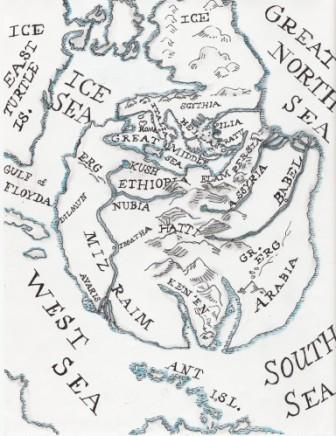
IN
PROGRESS,
VOLUME IV,
RETROSTAR


The first part contains the concluding part as well, with the interlude of the Basque campaigns over with in Part II.










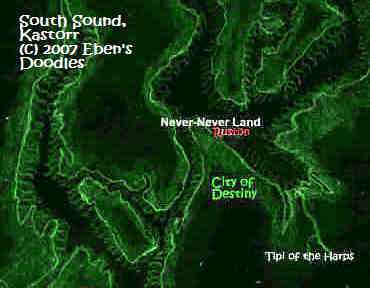
Now it was deserted--as this city was stuck in virtual reality, with scarcely an inhabitant to hold down Fort Nisqually that had been moved up to be the centerpiece of Point Defiance Park. He wandered around in the Park and looked in Never Never Land, which included both Mother Goose Land (a children's area with nursery rhyme characters) and the old, reconstructed fort.
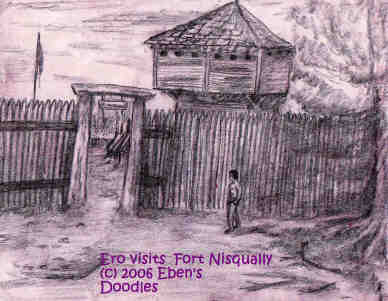
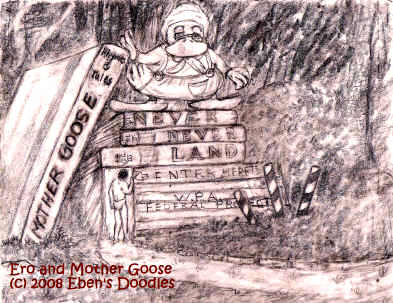
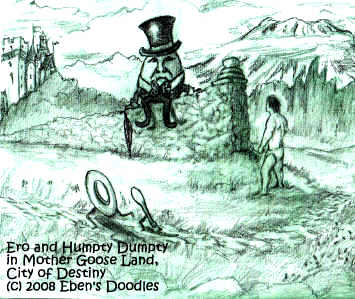
Humpty Dumpty had a great fall.
All the king's horsemen and all the king's men
couldn't put Humpty together again!"
That's what Ero read on the old WPA board, the letters now showing weather, badly stained and the paint flaking off.
But his popup alerted him, and he found that Wally had something to say that Humpty might not have thought of, but which could be of use to Ero.
He read the new verses of the Wally-amplified nursery rhyme.
"No egg but a cannon to blow parliamentarians to smithereens--
"Humpty" set on top the Colchester church tower while a squad of royalists cooked their beans.
They didn't know what hit them-- but Humpty met his match, that day. The top of Colchester church's tower was blown off, poor Humpty tumbled down all the way.
The crash was terrific, you could hear it a mile around,
and royalists scrambled to retrieve it, where it lay half sunk in the ground.
Alas! Twelve weeks less one they held Colchester town,
Yet Humpty would never be mended,
for a royalist blacksmith could not be found!"
Ero was completely puzzled, of course, like any Greek would be by this 400 pound Anglo-Saxon oddity. He had no idea what the parliamentarians and the royalists were fighting about. All they seemed to have in common were cannons, powerful ones at that, and a determination to wipe each other out if they could! It appeared that the royalists lost the civil war, at least at Colchester. Did they lose the whole kingdom? he wondered. He himself didn't seem to be the worse for it, however it turned out, so he saw no need to be concerned.
But Humpty himself, in his egg-form, was very much alive.
"Not that intrigued by British politics, I take it!" Humpty remarked chattily.
Ero nodded. "I never was much for English nursery rhymes. I am Greek, you see. We Greeks have been around a lot longer than any Briton! We have plenty of our own tales and verses. You know, Aesop's Fables? Well, I loved those as a child! And the famous heroes--Perseus, Jason, Achilles, Herakles, Hector, Aeneas--they were great stuff for me as a boy. I couldn't imagine life without them. But eggs that are really cannons used in a civil war--well, that is a bit too much of a stretch of imagination for a plain Greek. Can you explain why it should matter to me, sir, what happens to a cannon that looks like an egg-man?"
Humpty looked less grim, but a little indignant. "Really! You are a bit condescending for a Greek, aren't you? It should be the other way round. We Brits ruled the world, don't you know, something you Greeks never quite achieved from your little pond of the Aegean Sea! And I am not an 'egg-man,' as you describe me. I am perfectly human in every respect! Perfectly human! Michaelangelo's study for his statue of David in Florence--if I have to say so myself. It is you that looks most odd in my estimation!"
"No, I don't know that you Brits rule the world!" Ero retorted, a bit annoyed himself at the Egg's tone, which sounded to him a bit testy and arrogant. "But I do know that we Greeks ruled it, for quite a long time too--don't you remember Alexander the Great? Whom can you name of your country that compares to him?"
"Harumph, where would I start? Where would I end? We have plenty such fellows as Alex! Everybody knows the sun never set on the British Empire! That's how big we are--er, were! Yes, I admit the Empire isn't all what it used to be, and has shrunk a bit these days, but we ought to be given some modicum of respect for that, ah, accomplishment! What do you say to that, boy? Where is the respect due us from you colonials?"
Ero stared at the Egg-Man for a moment. "I am not your colonial and really don't know why I am speaking to the likes of you. According to my instructions, you aren't an egg at all, you are really supposed to be a cannon that was damaged in a fall from the Colchester church tower. Just because someone from the WPA made an Egg-Man character out of you and set you in Mother Goose's Land, you needn't think yourself a cut above a Greek and carry a chip on your shoulder. Can't you just sit there and let it pass, whatever I think of you-- after all, need I remind you, I am the visitor, you are the exhibit. I came for a good time, not a lecture on manners from the exhibit!"
"'Exhibit! Indeed!'" the Egg-Man snorted. "I never heard the like before! What an outrage to a gentleman's sensibilities! Is this what we've come to in civilized society? Must we pillars, the old guard and soldiers of the Realm, be insulted by a mere puppy of a boy like you?"
The huffing and puffing Egg-Man nearly fell from the wall, he was so indignant by now. And he wasn't finished with Ero either. "By the way, you rude, little fellow," he contined. "Do you always go about without a hat, coat, tie, trousers, the proper hose, spats, gaters and tails? It is disgraceful! Cover yourself up, boy! Look at me! I am most properly attured, as you can see, and I am only an 'exhibit,' as you so vulgarly put it. At least we Brits, unlike you low-bred Greeks, have enough sense of dignity to dress properly, whereas--"
At this point Ero felt he had enough of the pontificating Egg-Man, who was wheezing and short of breath and seemed about to fall off his perch. Not wanting to converse any longer with such a stuffed shirt, he turned away.
"Now just a minute, come back, young man! come back! I'm not finished with you! I've got more things to say--" Humpty shouted, but Ero kept going anyway.
"Such shameless, bad manners in these ignorant, little colonials!" the Egg-Man remarked. "He just walked away without so much as a tip of the hat! Such cheek! Well, that's an American for you! Manners are entirely lost on such barbarians and ruffians!"
"WE REGRET TO INFORM YOU, SOMEONE HAS STOLEN HUMPTY DUMPTY. IF YOU SEE HIM, OR KNOW WHERE HE IS, PLEASE CALL 535-HUMP. A REWARD IS OFFERED."
What a job that would be, lifting this 400-lb. Egg-Man without breaking him and then getting him off the property! He must have had some awful experiences, yet acted like a conceited ass so stuck on himself. But something came of the strange encounter. Ero was extremely curious to discover where reality and the WPA ended and the fantasy took over. Was it all fantasy, sheer make-believe, was he in a world of its own? How could he tell what was real anymore? He had to try to find out if he could. He spotted a castle beyond the Egg-Man's wall. Was it real or a fake? This sort of question suited a Greek more than any other question. This would be just the thing to check out, he thought.
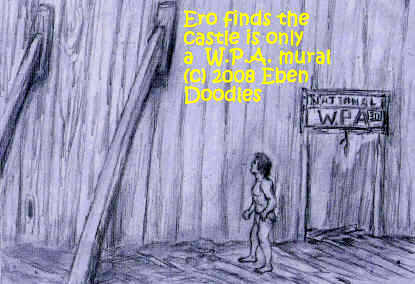
He was still standing there, wondering where he should go next, or whether he should just take the shortest trail out and back to the City of Destiny, when the loudspeaker system crackled to life.
Ero heard someone manhandling a crackling microphone, then a voice, "Testing, one-two-three-four-
if you think this is too loud,
then don't get sore.
It was too loud, but the voice continued, singing.
"Hey, this is Matthews Washington Nesby your pal and friend
--you can have my shovel, pick, paintbrush, hammer and nails!
I now workin' for the old Navy, which like Uncle Sam never fails!
Sorry I can't work with you to the end!
I'm gonna sail, I gotta ship,
If ya'll don't like it, I don't care a flip!"
Hey, like that rhyme of mine? I worked hard on that one to record it for the loudspeaker system! Ya'll deserve that much from old Nesby. Well, I enlisted in the Navy, and I'll be leavin' here and you won't see me come next shift. Say a prayer for me, I gotta go fight the bloody little Nips who done us bad at Pearl Harbor--"
The loudspeaker crackled, sent out ear-splitting, high-pitched shrieks, and then went dead.
Ero rubbed his ears, then left the WPA's fake castle. He decided he would still look around a bit more. Continuing on his tour of Never-Never-Land and Mother Goose, he came next to a girl sitting by herself, eating something he couldn't imagine any girl in her right mind would want to touch--something that looked like--well, Greek goat yogurt that had gone bad!
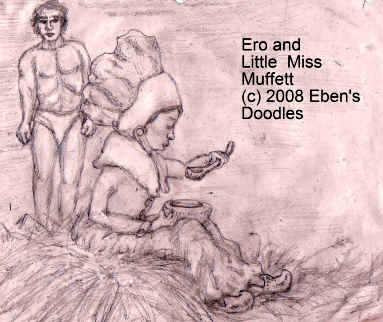
"Little Miss Muffett,
sat on a tuffet,
eating her curds and whey.
Along came a spider and sat down beside her,
and frightened Miss Muffett away."
Ero read the rhyme, which he hadn't seen before, and it meant nothing to him, of course. But again, the Wally-popup on the screen tried to be helpful:
"NO CERTAIN MEANING KNOWN. MEDIA LIBRARY ARCHIVES SUGGESTS THE POSSIBLE ASSOCIATIONS AND MEANINGS:
The reason MISS MUFFETT screams and runs off is apparent by the looks of her uninvited GUEST, who happened to be a governor of the PROVINCE when it was a province of the COUNTRY in question.
Ero saw the highlighted words and clicked on each in turn.
MISS MUFFETT turned out to be: the horrified electorate, that learned too late what scandals and corruption riddled the whole administration that they had voted into office.
GUEST was the loathsome, money-grabbing spider-governor, Garry Locke, who headed the administration that was sucking the blood out of the electorate with an elaborate system of bribes, pay-offs, kickbacks, excessive taxes, runaway spending, diversion of public monies to private bank accounts and rewards to political cronies and groups that had helped him get elected.
PROVINCE was Washington State in the COUNTRY, the now defunct Federal Union of the United States of America.
Ero clicked on HOME, and the popup snapped back. "Well, that explained the old English nursery rhyme," he thought. Why should he care about the piggish and priggish Miss Muffett and her problems though? Greeks had their own corrupt governments. Their governments had always been corrupt to the core. It was nothing new. They had the Turks once to deal with too, making everything infinitely worse, a fragment of hell. At least now, the monsters in office were their own! That was something at least to be thankful for, even if there was never any improvement in the government, and the country was always on the verge of bankruptcy and chaos.
Again, he reminded himself that Miss Muffett was just a cardboard or paper mache mannequin, with a soundtrack and voice pre-recorded on big 78's and and set to play whenever a visitor showed up at her site.
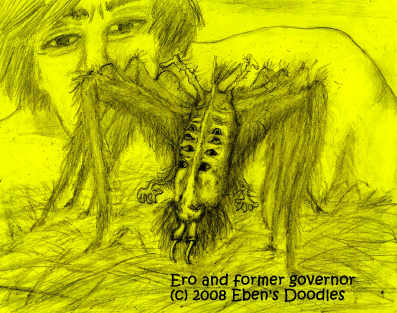
Now what else was there to see. He looked around, and couldn't miss the mountain covered over with glowing lollipops. They glowed all the more as the lights suddenly dimmed to night, intentionally or not.
But he didn't want to remain there, and started to run through the scene, hoping he would find the path that led him out of Mother Goose territory and back to the main gate.
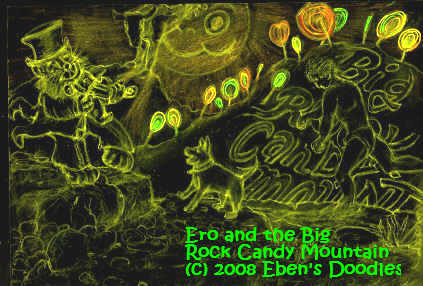
Then, even more crazy, a Cookie-Man dashed by him.
What was that? he wondered. He followed to find out. It took a burst of speed for him to catch the fellow, who was anxious to keep ahead of a flock of hungry, big black crows.
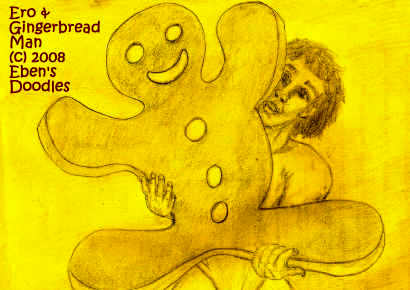
He next encountered someone very different, not so likeable. It was like watching Miss Muffett making a pig of herself on spoiled yogurt!
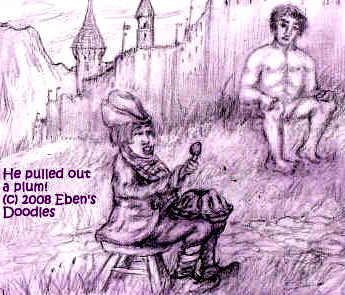
"That's the mistake of being too edible in this world!" Ero thought, as he observed the latest Gingerbread Man torn apart by the vicious crows.
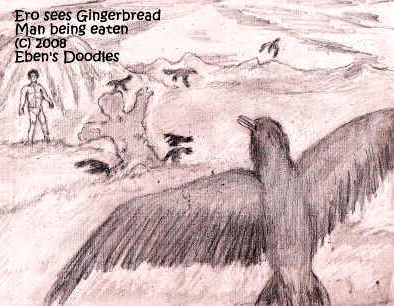
To get it out of his mind, Ero continued walking down this lane and that. He came to a pleasant country scene, very much like farm country.
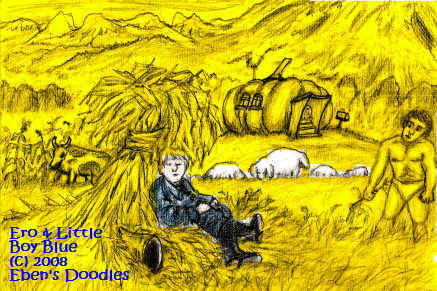
"Little Boy Blue,
come blow your horn.
The sheep's in the meadow,
the cow's in the corn.
Where is the boy who looks after the sheep?
He's under a haycock, fast asleep.
Will you wake him? No, not I.
For if I do, he's sure to cry."
Ero took a closer look at Little Boy Blue under the haycock. Really? Would he cry and shed real-looking fake tears if he waked him? Should he test the rhyme out?
Ero couldn't help himself. He reached out and prodded the sleeping shepherd boy, who should have been awake to protect the corn and watch the sheep but was dozing soundly, as if the whole world could go by and he had no care for it whatsoever!
It startled him when Little Boy Blue's eyes popped open, saw Ero, and didn't cry exactly but began quoting Thomas Wolsey to the effect things were not going so well for him. Now Thomas Wolsey was a notable figure of the distant past Ero knew nothing about, but who cared to mourn with him that he had put all his eggs in life in the wrong basket? What in the world did a shepherd boy like this have to do with a man called Thomas Wolsey who had made some kind of bad investment?
Ero consulted Wally's Library immediately, and he was led to various sites with information on Thomas Wolsey.
He found among the items this anonymous portrait of the great Lord Chancellor of England:
"My, oh, my! He was a fighter,
one hat red, the other York's mitre.
He was not only churchman,
but verily the king's right hand.
Not fish, not fowl, his powers combined
mix't fear and hell into the writs he signed.
Lord Chancellor, he was kept very busy
and knocked the English Nation into a tizzy.
Henry VIII gave him loose rein,
you might say it was Wolsey's reign.
A wizard with his courts and tax,
gold and silver stuffed his sacks.
He built a palace fit for kings,
forgetful that man's fortune swings.
One day he may dine on gilt,
but on the morrow his blood is spilt.
Henry--in trouble with Pope--finally had enough
of Wolsey and his pearly cuff.
He took Hampton palace, gave Wolsey gaol,
the kind with no reprieve or bail.
But on the way poor Wolsey croaked,
disillusionment-soaked.
Matthew Sixteen rang his death knell--
he knew it, he knew it, quite well!
No wonder he turned so sad and blue!
The fowler jerked, Tom's spent soul came due!"
But nursery rhymes have great variety, he found. Anything was possible with them.
The next character was seemingly just the opposite from Little Boy Blue, he discovered. Unlike Thomas Wolsey, the little maiden with the huge bonnet and dark, saucer-like eyes wasn't dozing at a critical moment, unaware of the forces that were about to pounce and sweep him away forever. No, she was very much awake, and frightened too. What was making her so upset?"
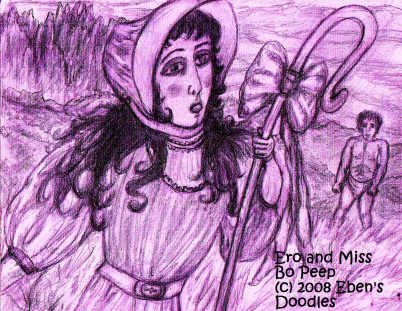
He read the WPA board that he found lying down on the ground in the tall grass.
Oh, is that all? he thought. The girl lost her sheep!
"This is ridiculous. Am I supposed to care about that? Shepherds are always losing their sheep, aren't they? They do on Seriphos! Sheep are fools and love to wander--they always will. It's their nature to wander and get themselves in all kinds of trouble!"
The popup helped him out with the information that a 1927 silent film was one of the last made by the famed pioneer filmmaker, Griffiths, with the Gish sisters starring and featuring various nursery rhyme characters including Miss Bopeep. It had been a smash hit for seven straight months at the Broadway movie houses, and another film along the same lines was planned but all the silents in production were suddenly cut one dark day when the Talkies came. That was in 1929, transforming the movie industry instantly overnight. The Gishes, silent screen heroines who had already made millions, lost more than sheep in the transition and also the Wall Street crash. From then on, like hundreds of other silent film stars, they had to be content with bit parts in Talkies, or become complete Has-Beens--the very worst thing that could happen to celebrities. Aging actors and actresses, living in cheap hotels and decaying Catskill resorts, their costumes gathering dust and moths in trunks and empty brandy bottles thrown under the bed--horrible!
He caught up with her, curious to find out how she might react.
Was she a mindless doll? She certainly looked like one. But the WPA had done a great job, and Miss Bopeep turned to face him when he called her name.
"Yes?" she said in a tiny, childlike voice. "I heard you and your sister lost your careers in the movies, I mean, when sound pictures came in. Wasn't that a hard thing for you to deal with back then, Miss?"
Miss Bopeep's eyes widened, if they could widen anymore. Her mouth, a rosebud, nearly disappeared as she considered what he had just said, and her forehead showed a crease as if she were thinking very, very hard.
Then a brilliant smile flashed at him from her eyes, without any teeth showing, however, just that tiny red, rosebud mouth of hers.
"Oh, not at all! Lilian and I had such a smashing good time. Where is Lilian anyway? She has to be backstage waiting for me. She's my stand-in, when my feet get tired, you know. And when I take my turn at stand-in, I do the same for her, and our producers never seem to know the difference just which one is doing the acting! Well, as I was saying, we both realized this fun we had making films couldn't last forever. Nothing ever does, does it? So when we weren't wanted anymore as leading stars, we did the next best thing and applied for bit parts. All the producers in New York and Hollywood knew we were experienced at acting and could carry our lines without stumbling and forgetting, so they didn't mind using us, despite our names being so famous, more famous still than the actors in those films they were making with sound in them. Often, we took parts with no names attached, just walk-ons, just in order to keep working.
Yes, some younger actors and actresses resented us having become big stars long before them, but they soon got used to us, and saw we simply adored making movies with the gang, whether we made any more money or not-- that wasn't really our intention anyway, as both Lilian and I had plenty to last us, and then some, even if we both lived to be 100!
She took a few girlish, mincing steps toward him, then stopped. Her eyes widened.
But who are YOU, dear boy with all the questions? I don't believe we ever met. And what character are you playing, pray tell? I can't place you at all in the script. Are you a stand-in for somebody? Are you sure you are on the right set? This production is 'Mother Goose Goes to the City of Destiny.' It's a sequel to 'Mother Goose Goes to Washington,' I think. Well?"
"My name is Ero," he said. "No, I am not a stand-in. I have never been through here before. You see, I am a visitor."
At first she stared at him blankly. Then she reacted, all of a sudden very talkative and lively. "A visitor? But we don't have 'visitors'! You mean you just wandered onto the set like this? Who gave you permission to do that? And what sort of name is that? 'Arrow'? I never heard the like, except I recall an 'Arrowsmith', or something like that in men's haberdashery. How very strange! I had my doubts you were on the right set!" she declared.
"We don't have 'visitors' on Mr. Griffiths's sets. Imagine such a thing! How could we get any work done! His epic, "Birth of a Nation" drew loads of looky-yous, but Mr. Griffiths had been quite stern and made sure they didn't interfere, else he could have never gotten it done? Now I really suspect you don't belong here, Mr. Arrow! You take yourself off immediately, or Mr. Griffiths will hear about it surely, and send the Pinkertons to escort you off!"
When he didn't move immediately, she remembered that there was a list somewhere that could prove if he belonged or not, if she could remember where she had last seen it. She had to find out if he was truly an actor on the Mother Goose production or was a walk-on tourist trying to rub elbows with famous movie stars--they had plenty of such nuisances invading the lots in Hollywood and didn't need any more.
She fumbled in her bag, which she pulled from behind some fake hollyhocks, and the script fell out of her hand, and the list she was searching for flew in a different direction.
Ero quickly scooped both items up and handed them to her.
She smiled again, curtseyed in an old-fashioned way, then excused herself. "Sorry, I treated you so rudely, young man. I was so surprised to have to deal with an intruder, I mean, a 'visitor' on the set. But I don't have time to check your odd little name! I really must be going! The director will be angry if I don't keep playing my part to the end. I can't risk being put out to pasture--not at my age, as I'd never get hired back once I left. And darling Lilian would kill me if I got us both sacked, that is, so I mustn't delay any longer. Adieu!"
Ero watched the little worrywort run off, pause dramatically to shade her eyes with a hand, and then call with the other gloved hand cupped to her rosebud voice--soundlessly--to her lost sheep in the meadow.
It was all done so dramatically, as if a piece of sculpture were moving, and it fascinated him to see her old-fashioned acting style performed with such perfection.
Apparent to him, this little aging but still eternally girlish star of the silent screen loved her bit part and was content to play it forever, exchanging places with her look-alike sister in the wings whenever she felt like a rest.
"Well, let her play the part then, silly as it is!" he thought. There had to be more to life than being big-eyed and running around looking for lost sheep in a land of make-believe, wasn't there? Who was there, besides himself, to admire her acting ability anyway? He didn't see anyone connected with the production staff around. The director and producer, Mr. Griffiths, where was he? Or her sister Lilian? She seemed to be the only actress on this part of the set. Nobody was even filming it!
Ero continued walking. He came to a strange scene--rail tracks and a little railway car fashioned like a washtub that ran on the rails, with the main character, Jack, flying overhead on wires and little wheels and pulleys.
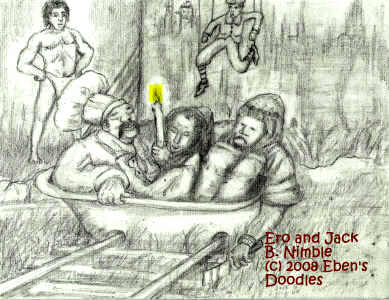
"Jack, be nimble,
Jack, be quick.
Jack, jump over the candlestick.
Jack jumped high,
Jack jumped low.
Jack jumped over
and burnt his toe!
"Rub-A-Dub-Dub,
Three Men in a tub.
And how do you think they got there?
The butcher, the baker, the candlestick maker--
They all jumped out of a rotten potato!
It was large enough to make a fish stare."
Ero looked again at the scene, then thought he recognized the three men in the tub, though they were all sleeping, or stone drunk. No wonder Jack was jumping over the candle in the rhyme, the Candle Stick Maker crammed in with the other two characters.
But where or what was the fish? he wondered. And there was no sign of a rotten potato either.
Poor Jack, even if he was wearing Banana Republic's pants, all he got was a burnt toe!
He tried Wally's HELP again for any more references, and was immediately presented with ROTTEN POTATO and FISH and TOE FRAGMENT DISCOVERED FROM LOST STATUE OF LADY LIBERTY.
"I'm in luck!" he thought. The mystery would soon be explained.
Rhymes came with ROTTEN POTATO, one of a number of more modern nursery rhymes that children were singing long after the events, without any understanding of course what they were really about. It just amused them to sing about a rotten potato named Nancy.
"Ms. Nancy Pelosi is a rotten potato.
She puts out for big union guys, you know.
Don't wake them up, they earned their rest.
They rode her rails--tsk, tsk--and did their best."
Ero didn't know who this "Nancy Pelosi" was, so it meant nothing to him.
He tried Wally's HELP again.
HELP drowned him with screen after screen of rapidly scrolling dope on Ms. Pelosi. Nancy had been a 21st century liberal Congresswoman and a radical activist for all sorts of shady causes that always served her interests first. Becoming "Speaker of the House" after years of wheeling and dealing, she lay in bed with unions and with extreme activist groups and even Muslim jehadists--for she was a "reconstructionist," a socialist or Leninist, determined to make over the constitutional republic of her country into a socialist paradise that would support her high among the super wealthy governing elite while reducing the mass of people to cringing, dependent wards of the all-powerful State.
Ero didn't like the Speaker- Woman's description from these details. Speaker-Woman claimed to be a loving grandmother, but she was so cruel as a witch at heart, to rob her own people (and her own descendants TOO)of all their freedom just so she could gain immense power and money and prestige while she was in office. As a Greek who loved freedom more than life, he could not help but abhor such a low creature, who sold everyone down the river to serve her own interests and her party's.
That was enough Grubstreet politics of the 21st century for Ero! He was Greek, a nation famed for clean, sharp lines, not foggy grays. Oh, certainly, old as it was, Greece had long-standing problems with self-serving politicos of its own to deal with, so he didn't need those from this no longer existing country called the United States of America! But evenso, Greek crooks stood out in sharp contrast, they couldn't be disguised because of the clarity that surrounded them--such a contrast with the 21st century's crooks, who merged one with the other, a clot of sameness and mediocrity with only one passion: getting more wealth and power, no matter how many people had to suffer for them. Sucking parasites, they finally sucked their host white of all its vital juice, then they started on each other, and finally at the end there was nothing but drying husks of parasites littering the barren landscape! Oh! he thought. Couldn't they see what was coming? Didn't they care? Apparently not! All they could think about was sucking, sucking, sucking, till they had sucked out the last drop of blood from their host's veins. Vampires all, they never changed.
The scene shifted to something very different with FISH, fortunately, as Nancy Pelosi's scene left a bad taste in his mouth.
So how about FISH?
Another rhyme from the HELP icon: "'Fishy, fishy,
in my dishy!'"--
sings Sally, that saucey servant wench.
I eat her fish,
clean up the dish,
and Jack in scullery does the wash-y.
That seemed innocent enough to Ero, but a HELP WORD, MOSQUE, popped up.
It gave him:
"A mosque on Ground Zero deseves a zap.
Mayor Bloomberg okayed it,
but he's a sap.
Firefighters, policemen,
they know the cost
when over three thousand lives were lost.
They didn't die by some mistake.
It was all planned out, for Allah's sake.
Islam has a darker side,
It lays a trap, Obama lied.
Hooked and drawn to your defeat,
you've no one to blame, but the elite.
They eat their fish, and throw the bones,
and dance in the ballroom while the beggar moans.
Betrayed and beaten, no house, no job,
you voted for leaders who know how to rob.
It's too late now to turn it around,
your country is now wholly socialist-bound."
Well, what about TOE? He thought he could do no worse than he had already done.
"When Iranian missiles struck New York,
and hit capitals across Europe in a lightning strike,
Obama was lifting a champagne cork,
and naked riders in Seattle cruised downtown on a bike.
Those clouds took some time to dissipate,
and while doing so sealed Western Civilization's fate.
As glaciers receded in the long ages ahead,
and nothing was remembered, so nothing was said,
a simple Toe, giantess-sized, washed up on a beach,
and if it could speak, a lesson it could teach--"
'Don't be fools, like us who burned,
we threw away Wisdom, what our Founders had learned.
We made our own rules, and laughed at the thought
that we had enemies, and that we could be bought.
Oh, they bought us for sure, and then foreclosed,
and bought armies in while our sentries dozed.
After the EMP, they pulled the net trip,
and by the fowler we were taken, just like Ismay's ship."
"Ismay's ship?" he wondered. He hit SEARCH. That gave him Lord Bruce Ismay, owner and director of the White Star Line that built and launched the R.M.S. Titanic in 1912.
My, he was certainly learning a lot, he thought, but he decided to go on, as he was spending too much time on these items, and needed to complete the tour of Mother Goose Land.
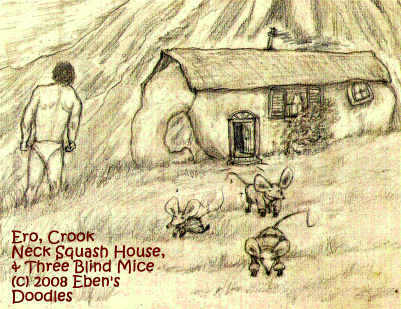
Here was a WPA sign that had escaped the ravages of weather and time:
"Three blind mice,
see how they run!
They all ran after a farmer's wife
who cut off their tails with a carving knife!
Did you ever see such a sight in your life
as three blind mice?"
No, he hadn't!--as a matter of fact.
Ero looked around, but no farmer's wife appeared to cut off the mice's tails.
Not that he wanted to see this part happen! But the mice went through their role in the story anyway, and ran from the squash-house belonging to the farmer as though his wife were pursuing them with a big knife.
He turned to the unfailing, faithful little Wally via the screened console.
Wally first gave him, surprisingly enough, WALLY:
Ero clicked WALLY. "Iranian whistleblower in early 21st century. Classified information from secret service files that was later declassified, identifies the mice in the well-known nursery rhyme as a volunteer informant in the mullah-run dictatorship of a certain Iranian regime. Taking the name Wally, he fed information to the Americans for years about the secret attack plans of Iran, which targeted European capitals and Israel and the Persian Gulf emirates and states. One of his messages: 'RED ALERT! REPEAT. RED ALERT! They are going to attack with a pre-emptive strike, it is certain! An electro-magnetic pulse, generated by a plutonium explosion high over the American Midwest, will be the means to render the whole country powerless to defend itself, and at that time Iran and her allies will send in their attack forces from the north and south, east and west, simultaneously in order to overwhelm any tracking agencies that are still able to detect incoming objects.'"
Really? Ero thought. But did they ever catch the mouse and his two friends? The rhyme wasn't very encouraging. And that farmer's wife! She certainly had a cruel streak to her! Did she represent those mullahs that ran Iran? Evidently, and knife-wielding mullahs did not promise a particularly nice ending to the story of the fleeing mice.
But HELP could not furnish him with any more data on the Wife directly, as the files had not survived that could tell him the secret agent's end, whether good or bad. Instead, the CROOK-NECKED SQUASH came up, taking him yet another direction with a set of verses called:
"The Pumpkinification of Governor Gregoire,"
"The Crook-Necked Pumpkin swelled orange and mostly round
admidst eco-green vines that choked the ground.
This goddess springs forth at birth,
no shell for Venus but plain earth.
Tractors pull her hybrid car
covered with crepe to where the Fair crowds are.
ACORN bands with pot plants twirled
escort Christine in parsley swirled.
'O Queenie of Hope and Change for all!'
intones a priest in the Progressive-packed hall.
'Bless thou our diverse society,
and crush all right-wing extremists from Spokane to sea!
Reign over this thy paradise,
no ethics here, no morals, just lies.
Sell hard stuff in state-run stores,
thanks to Her Majesty the booze tax pours.
Yes, on Sunday too, that's her law;
You say DUI's took your ma and pa?
Dry your tears, child! Drink Christine's Reserve Beers,
and just be glad Comeuppance nears!'--
"Well, they hauled him away,
he's lost his mind.
He'll get sensitivity-training and a
very stiff fine.
Judgment Day's coming for the Crooked Pumpkin,
She'll not talk her way out of a single sin.
He decided to move on to something more pleasant if possible, and he came to a big clock, the kind once seen on street corners outside downtown jewelry shops. He had to wonder how long it had been stopped at that particular time, and why no one had come to fix it.
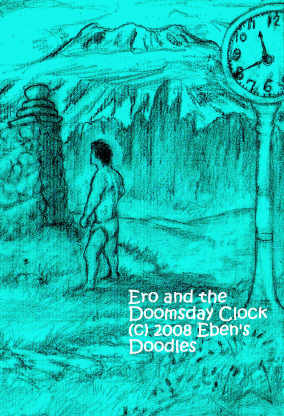
TITANIC and DOOMSDAY CLOCK.
He was surprised, for he knew that was the name of an old ship that sank a long time ago in the north Atlantic. Was this clock taken from the ship? he wondered.
The verses that Wally supplied from an anonymous source gave him more information:
"Mark the time, when this ship shook,
when star and ice produced a hook,
a cruel thing that struck its prey, by thousands drowned, on the seabed lay.
There the rich man, there the poor,
there the boilerman under a watertight door.
Is that the captain that went down with his ship?-- right next to a champagne glass with a ratfish at its lip?
There the sucker, there the card sharp,
there the cards scattered across a gaily striped tarp.
Deck chairs, Parisian gowns, toilets and jewels, all tossed in a salad with wise men and fools.
There's no such thing as a lesson learned.
Nothing is gained when a finger is burned.
Man's other parts will yet be hazarded,
experience is scorned, when all is done and said.
They perished in vain, and are voicelessly crying,
"Take your flowers away,
they scorch us, for dying.
What happened to us will happen to you!
Go mind your own folly, you'll reap your fate too.
Just mark the great Clock that stopped with our lives--
that Clock chimed for you as well as Dives!"
Ero clicked it.
he never gave one thought to hell.
Whate'er he wished, he could afford,
in his vaults his gold was stored.
A poor old man lay outside his gate,
while Dives dined until very late.
The banquet over, he went off to bed, while the old man outside groaned unfed.
Lazarus was his name, and dogs his friends,
the only comforters misfortune sends.
They licked his sores, warmed him at night,
that was all they could do until it grew light.
Another day dawned, but Lazarus had died,
the dogs howled for him, whimpered and sighed.
Angels came and took his soul in hand,
and brought him to his loving Father Abraham.
There he was comforted for years of pain,
when outside Dives' iron gate, suffering, he had lain.
Dives died, but found himself in fire,
in darkness and heat like a funeral pyre.
He lifted his eyes and saw a beautiful scene,
flowers, trees, and grass--what could it mean?
He looked again, and then cried most amazed,
"Why, that's old Lazarus!" Or was his wits dazed?
Yet it was he, the beggar he knew,
who dirtied his gate and spoiled the view.
Why should he be in such a nice place,
such a horrible creature, with sores on his face!
Then he saw next the beggar, his arm round him fast,
Father Abraham who all good souls eternally hast.
"Am I in hell? Was I so bad?" thought Dives? I never killed anyone, just beat my wives!
Plenty men I knew deserved such a fate,
but this beggar--how can he paradise rate?
He called out to Abraham across a deep pit,
so deep, so wide, none ever crossed it.
"Father Abraham, cool my tongue, I thee pray. It burns, scorched black, all the long day!"
"Nay, son," said Abraham, "that cannot be.
You lived for yourself, with every luxury.
You closed your heart to the poor at your door.
And now you've become like one huge burning sore."
"Yes, that's true, but go send and warn my close kin,
lest they too continue in their sin.
My brothers--surely, they will listen to you,
please warn them not to come here, if they ever knew!"
"But they won't listen--they scorned prophets sent.
God's warnings rejected, they'll never repent." So that was the last time they ever spoke.
The nightmare continued--Dives' clock had broke.
He had seen some awful places in his life, but what happened to the selfish rich man was worse--and it was the result of his own choices, apparently.
Yet he soon found he was mistaken if he thought there was nothing that approached Dives' torment. As he walked further on, he soon came to a scene of terror and destruction beyond anything he had yet witnessed. A whole city was engulfed in flames mounting high into the sky!
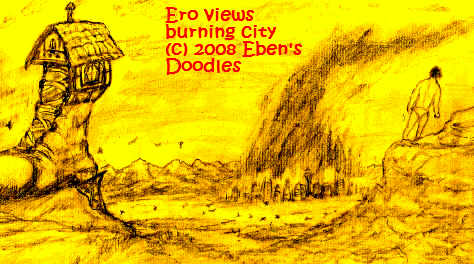
He turned around so he didn't have to see it, struck out in another direction, and found himself surrounded by thick woods.
He wanted to know, nevertheless, what city this could be, if only to avoid it if he possibly could! Wally's programming was helpful once again, and gave him, "SEATTLE" to click on.
What came up explained what Seattle, the Emerald City so-called, was all about, as he read:
The tree trunks were enormous! Greece had nothing like these trees for size. Nor had the ancient aboriginal Hellenes reported the existence of giant trees in old, pre-Greek Hellas. One was even large enough to be used as some kind of dwelling, apparently.
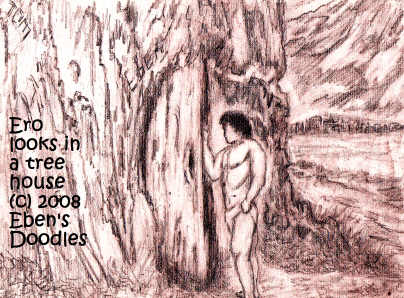
He could see signs it had been long abandoned, though. Cobwebs and dust were thick, and there was no sign anyone had been there for a long time.
He felt like an intruder, but he went in.
As soon as he was inside, a very tall, lanky shadow moved and stepped forward, astonishing Ero. He was the strangest looking man he had ever seen, other than the Egg-Man!
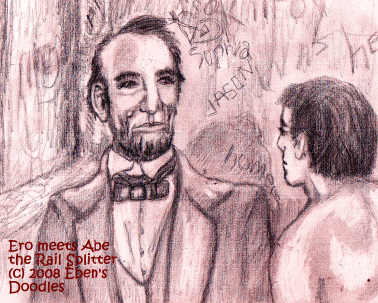
The old gentleman smiled gently down on Ero, then looked a little confused. He removed his stovepipe hat and scratched his head. "Reckon my memory is resting a spell, young fella," he finally drawled. "But would you be so kind, Perhaps you can tell me a little something--and I'll get get my box of memories back. Otherwise, maybe I ought to go look for it."
Ero was at a total loss, but he could always consult Wally's yellow questionmarked HELPs. Maybe Wally could come up with this nice old gentleman's lost identity.
He had to type in a description, as he hadn't a name, and Wally the expert at deciphering mysteries came to the rescue with ABRAHAM LINCOLN, U.S. PRESIDENT, EARLY DAYS, LAW CAREER, POLITICAL CAREER, REPEATED DEFEATS AT THE POLLS, PRESIDENCY, CIVIL WAR, MARRIAGE, ASSASSINATION BY JOHN WILKES BOOTH, CHIEF CONFEDERATE CONSPIRATOR HEADING ATTEMPT TO OVERTHROW FEDERAL GOVERNMENT BY ASSASSINATING TOP LEADERS.
Ero was given a poem to start the file:
"Repute," by Stuart Hawkins, a poet in the 20th Century, who was one of the few honest men left in the City of Thieves
"Abe Lincoln was once a shopkeeper
who rose to the ultimate top
But who would remember his wisdom
if he kept on keeping shop"
For starters, this was enough, Ero thought. "You kept a shop somewhere, sir, before you became President of a country called U.S."
The gentleman stroked his wispy beard, meditating on what Ero had revealed.
"A shopkeeper, you say? Still don't ring a bell, son! Well, that is at least an honest trade, I reckon. What was the merchandise I traded in, son? Maybe that would help me a tad more get my bearings straight."
He went into that and found items like: Higgins' Superlative Boot Black, Paul Revere Silver Tarnish Remover, Jenkens and Son's Nails All Sizes, Iron, Bronze to Copper, Mother Jubilant's Soda Crackers, by Barrel or Crate, Godey's Fancy Dresses and Hats for Ladies of High Fashion, Gingham by Bolt or Piece Measure, Calico by Bolt or Piece measure, Roebuck Shovels, Pitchforks, Hoes (all sizes), Cultivators, Harness for Mules, Horses, and Donkeys, Olson and Son's Fancy Chicago Canned Meats, Onion Sets, Wheat Seed, Corn Seed, Hatched Baby Chicks by the Crate, Roebuck's Fancy Straw Brooms, Feather Dusters, Flypapers, No-Fail Gopher Traps, Remmington Rifles and Pistols, Horse Shoes all Sizes, Nabisco Flour by Sack or Measure, Sorghum Molasses, by Bottle or Tin, Select Havana Cane Sugar by Sack or Measure, Rice by Sack or Measure, Argo Cornmeal by Box or Can, Madame Tourray's Whale-Bone Corsets and Bustles, With Assorted Trusses, and Gynmnastic Appliances for Weight Reduction After Child Bearing, locally brewed Spirits and Hard Apple Cider in bottle or earthenware or hickory-lined jug, --the list went on for a couple thousand other items. Ero thought these would do as a sampler to jog the old gentleman's memory.
He started reading them off, and he didn't quite get half-way down the list when he heard a commotion, looked up and saw the gentleman was tapping his huge head head with his big, bony hand, and shifting back and forth on his feet, his eyes wide with what he was remembering.
"Hold it, hold it, young fella!" the gentleman cried out. "My head is plumb near to splittin' with--with--"
He staggered to a bench, slumping down on it, and Ero thought it might collapse, by the sound it made.
"Lord, Lord, I do recollect," the man marveled. "It's all come back! Why, I was store keepin' back in my own home state, doing none too good a job and going bankrupt at one point, but paid back all the creditors, then went to lawyerin', did better at that, almost got myself a sweetheart of mine, but--but she passed-- nearly killed myself then, but got my spirits up and went on, lost so many elections, can't count them all-- got married to a society lady from the South, children, the Presidency, then the war that tore the Union and us all apart--"
He broke off, his head dropping, and Ero wondered if he were ill, he just sat there breathing heavily, so heavily he was sounding as if he were in deep pain.
Ero watched in astonishment as huge tears began to course down the man's heavily lined cheeks and spatter on his shirt front, and the man made no effort to wipe his eyes as if he didn't notice.
With that remark, Lincoln rambled down the path away from the tree house.
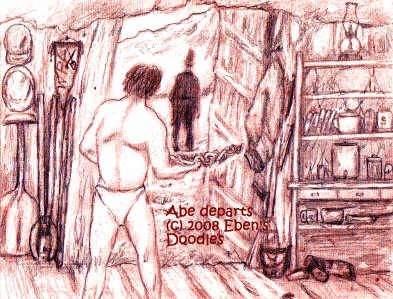
He too felt his feet restless beneath him. Why should he stay in the WPA's old hangout. Doubtless, there were many other things to see.
He took the path leading away and was soon in the thick woods again. The path narrowed, then vanished beneath his feet.

Looking at it, he was wondering what stage presentations the children had once viewed there with delight. It must have been wonderful, he thought. He went round the back, and found a backstage door off and the room tumbled and torn up by vandals. Peering into the gloom, he saw paper litter on the cement floor, and he reached and pulled out some items. Two were playbills from the 1990's, describing the last presentations.

Ero turned back to read the faded, water-damaged playbills. One was "Peter Pan" by J.M. Barrie.
He knew nothing about Peter Pan, of course, but the illustration showed what looked like a young man, or possibly a girl, dressed in green tights swinging on a rope above the stage.
He wanted to know what Peter Pan was about, so turned to his helpful, big yellow Question Mark icon and clicked with his index finger twice on PETER PAN REVISITED, A BALLAD OF THE ?? IN GREEN TIGHTS. What came up was:
"The Ballad of the ?? in Green Tights,"
A cross, a hybrid—a Robbin’ Hood-Peter Pan?
She swings from the rafters for the wallet
Of every man.
Does she really think she fits this our time?
I guess, as she scoops up every nickel and dime.
She’s green like the grass, and trees, and our bucks,
But her tax program soaks everyone including the ducks.”
She’s “Robbin’” and got her big hooks in our Hood.
We’d ship her to China, slow boat if we could.
People like her they grind for chop suey,
Before they even get one little clue-y.
Whatever the Chinese perceive as a threat,
Off goes its head, it won’t last, you can bet.
Thousands of years, they’ve seen every type
Of con artist, crook, and wolf in pin stripe.
This masquerade foisted on us as our chief,
Over there would be treated as a petty thief.
Let her crack the whip, and sign her tax bills,
When the Sheriff arrives, she’ll be gobbling horse pills.
It won’t help a bit when her whole crew ships out,
From her thieves’ nest that has a convenient seaport.
Maid Marian, where are you when you’re needed most?
Can’t you rally Seattle’s worst, not best, to boast?
They’re paid good money to support such as her—-
It’s normal for them to stick on like a burr.
But maybe they got wind like rats there’s a hole
Right in the hull of the ship’s very soul.
It’s gonna sink fast, this whole scheme of hers,
So why climb aboard?—you need feathers, not furs.
You better run, or fly if you can,
From this wriggling, sinking, hopeless worm can.
She may think she’s got a Royal Viking cruise ship,
But look what greed opened—in the bow a big rip!
Oh, Friar Tuck, can’t you bail out her boat?
But the hole’s got too big, and she can’t stay afloat.
Bye, bye, it’s no surprise there goes sly, old, fat Tuck,
First to high-tail it now Robbin’ ’s lost Lady Luck.
Amazing how votes put her in over Dino Rossi--
they kept “finding" more ballots just ahead of his posse.
But we shouldn’t be surprised when someone
Wears silly green tights?—-
Robbin’ Hood? Peter Pan? O King Arthur, PLEASE SEND YOUR KNIGHTS!
Yes, we have no money.
Liberals had a big tax ball,
And stripped us bare, right to the wall!
Born long after that era, Ero still didn't know what in the world Wally was talking about, until he viewed the clips that Wally provided for him to click on, using the screened console that popped up out of the strangling blackberry vines and litter of smashed seats.
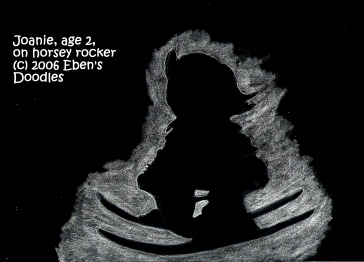
1940-
Rockin' on Joanie's horse,
Her Pop and Mom her joy,
A horsey was her toy--
Joanie out-smiled any boy!
rockin'...rockin'...rockin...

1952-
Singin' brought her fame,
and then she toured the world,
her banner--Peace!--unfurled,
hair, bangs, uncurled.
singin'...singin'...singin'...
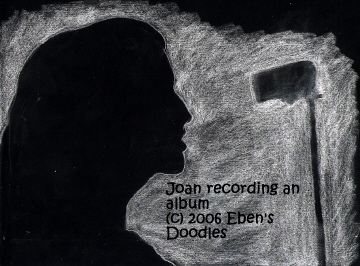
1987-
Hair short, she raised a son.
There's Someone at the door who's waitin'.
The inside latch not yet releasin'.
Hear that gentle, faithful knockin'?
knockin'...knockin'...knockin'...
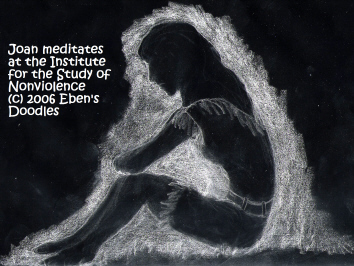
2006-
Has she heard the Answer in the wind?
Is she still out travelin' and folk singin'?
Is she still out war and nuke protestin'?
There's Someone at the door who's sighin'.
sighin'...sighin'...sighin'...
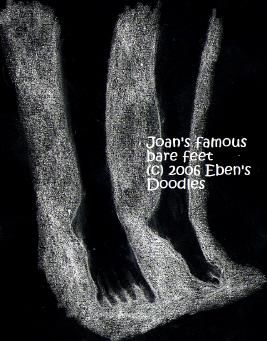
Even feet of steel can't last.
She's done her draft resistin',
and done her meditatin',
but every soul needs restin',
restin'...restin'...restin'...

He found the ruins of a train station! It was about twenty feet long, but shaped like a giant hotdog in a bun with all the trimmings. The remnants of one of the cars lay on the tracks, a tea cup turned over and its seats ripped out. He continued down the weedy tracks until he came to a ravine. Looking over into it, he saw there had been terrible disaster, the train trestle had collapsed and the engine and tea cup cars had all gone down and lay broken on the big rocks. Had there been passengers in them? If so, they would all have been killed, it was so far down.

"2TrainsRap
I
“All aboard!” a voice cried out,
The crowd rushed forward with a shout;
the whistle blew, the steam out puffed,
the clinkers clinked, the engine chuffed.
(Refrain)
This train! Oh this train!
Don’t take no preachers, no Bible-totin’!
This train! Oh this train! No public prayer, no gospel singin’!
This train! Oh this train! Sheer vanity, but gets you there!
This train! Oh this train! Climb aboard, Child, if you dare!
The Gravy Train is par to none,
you’re going to have a lot of fun!
Drugs, sex, and anything you want, it goes;
Where this train stops everybody acts like nobody knows.
A judge got on, attorneys too,
Their baggage stuffed with cash brand-new;
In First Class sits a billionaire,
and his banker and his best lawyer.
And there she is! That lovely lass!
Miss USA sure has got class!
Scholarshiped by U of Dub,
she wears her crown in the hot tub.
Drink up, boys! And do some drugs;
This latest stuff has got some bugs;
You might not see the coming day, but take the chance, man, anyway.
Those blond-haired kids tied up and gagged--
Seattle chicks that some trader bagged
in a mall or out from school--
they bring big bucks--oh, ain’t it cruel?
Want a magazine of porn?
The racks are stuffed like cribs with corn;
Here’s “How to” on kinky sex,
teens all use it for their text.
Choose a movie from the list,
Bette Midler’s never missed;
Like some violence and gore?
PG-flicks no longer bore;
Anyone with a gay bent
now can gang-bang, slice Clark Kent.
Or how about an “Evening Star”
whose PG-13 was an R;
Shirley MacLaine had it changed
(anything can be arranged).
Up front there’s “Jump on the track”
for those tripped out on crank and crack;
What else is there when you’ve done all
except to take the final fall?
Tonight there’s Beefcake in the bar,
add whipped cream,and he’ll go far;
Mickey Mouse is on tee shirts;
it adds some class to same-sex flirts.
“I did it my way,” croons a lush
as gay to gay connect up tush.
Need some cash? Go play the slots;
The tribal council’s upped the pots;
Bingo, high-stakes gambling too,
one-armed bandit, Topsy GREW!
Gangs, oh, well, it’s just some phase
these kids need to fill their days;
Parents let them play at school,
now they’re trained, each one a fool.
Empty-headed, goal-less thugs,
they prowl the streets, malls, for new drugs;
Now they’re on this train for sure,
headed straight for “Air-head Pure.”
No matter that they rob and kill
to get a fix, another thrill;
No matter that their victims die
most brutally, to their last sigh.
The judge on board, he’s lenient;
He treats their crimes like unpaid rent;
Society, he says, must pay,
for these poor youth it cast away.
“They’re victims! Not all those they shot;
Their big mistake was to get caught;
This court awards them to the street
[that butcher shop that makes ground meat!].
He lets them know with "bargain plea,"
they’re free to strike again most certainly!
Whene’er they’re hauled before his bench,
it won’t be such a nasty wrench.
They’ll know they’ve got a big heart here
who lets them off without a tear;
No matter what they’ve done again,
the game goes on, plug in, my friend!
How this train does roll along!
It’s no use to cry over wrong;
So times are bad and won’t reset?
Oh, well, who cares? Why stew and fret? You’ve got your fare paid to the end,
the train will crush what it can’t mend;
Officials and the candidate
boarded last --almost too late;
Bands, balloons, and speeches made,
his campaign surely earned high grade!
Promise good times are ahead,
pull some young thing into bed;
Pay her off if there’s a squawk;
Party Faithful? Take a walk!
This train rolls on no matter what,
the bridge is out, trestle kaputt;
The party still goes on full blast,
no matter that it cannot last.
Each passenger rides thoughtlessly--
“Why worry ‘bout what I can’t see?
Sex and drugs and party deals--
they’re thirty-weight to grease our wheels!
“Don’t ever tell us right from wrong,
or sing that old James Lowell song --
"We live our life in our own way,
yeah, who are you, sir, to gainsay?
“Where this train goes is our choice, [a trip to Hell in a Rolls Royce?]”;
Do you think they listened back when
Noah cried, "Repent, be saved, O men!’?
They had their train, he had his boat,
the problem was theirs couldn’t float;
“Repent!” he said, “or you will drown;
A Flood will cover up the town!”
“They partied then, we party now;
"Is that YOUR problem? I don’t see how;
This is OUR train, don’t you forget,
we’re going all the way, you bet!”
So onward rolled the Gravy Train,
playing smooth jazz (what, no Cobain?);
In diamonds and designer jeans,
they dined on Lo-cal French cuisine.
This cool and glitzy, done-all crowd
grew bold and brash and really loud
until a silence stunned the ear
as rolling wheels met thin, thin air....
At Dead Man’s Gulch the track stopped short;
The Good Times? All abort;
Tumbling, screaming stream of woe,
landing, smashing far below.
There goes Beefcake down the river,
he don’t move and he don’t shiver;
The rest are piled upon on the bank,
except for coaches that just sank.
Strange enough, the people cried the very Name they once denied;
“Christ!” wept a leading prize fighter,
the same man known ear-chewer, raper.
“Jesus!” moaned the Candidate.
“I’ve got business that can’t wait!”
His campaign’s clearly over now,
blood is bubbling down his brow.
“Pardon me, O God, my sin!”
pled the unjust judge within a shattered skull
as brains ebbed out,
his money scattered all about.
“I printed slush,
I purveyed mush!”
someone confessed in the hush
of bodies laid in long, white rows--
those who shuddered with death throes.
“I cheated on my husband, Dave;
He never knew, O God, please save--”
And then the woman died,
both legs cut off, laid by her side.
“I blasphemed You, dear Jesus, Lord!”
cried a lawyer beneath Death’s sword;
His testimony came too late
as devils dragged him through Hell’s gate.
Psychic, Larry Rainbow hissed
the Savior’s Name he widely missed;
His horoscope read “Take a trip”
and so he made his final slip.
His gang friends offed, a tough kid cried
“Who can find my arm?" and died. “No-ooo, not me...” the beauty queen told him,
her crown now lost to eyes grown dim.
Tribal councilman no more,
an old man turned from out-worn lore;
“Dear Lord Jesus, this is me!”
he cried for help belatedly.
A local mayor, he too was hurt,
his best-laid plans all lay inert;
“What matters now is...” all he said,
then medics covered up his head.
A young man and his wife and child
lay thrown amidst a tangle wild;
he wondered how his theater would fare
without him acting manager.
A renowned bishop, firm Pro-Choiced,
heard the cries of the Unvoiced;
“You killed us, forty million strong,
then preached on civil right and wrong!”
A warlock sweating sure, sharp fate
now thought of all the things he ate
in rituals his coven staged
with children kidnapped and then caged.
A teacher in the public schools
now said, “God, we acted fools!”
Too late she turned a penitent,
the Class of ‘10--hell-bent!
A master contractor of fame,
Curt built great mansions for sheer gain;
Now they’ve crumbled in his view,
his prospects void, to start anew.
He thought of housing for the poor
he could have built--but no more!
Instead he catered to the rich,
and now his dreams lay in this ditch.
A pro athlete figured his score:
“Zilch, I guess, I’m out the door!”
No more babes and drugs and stash,
no more chance, it all went smash.
He lay a rag doll, paralyzed,
it hit so quick he was surprised;
There was no way to use his legs,
for now they’re stiff like wooden pegs.
A hustler on the SeaTac scene,
Krysti saw her life obscene,
how she threw away all good
for nothing really--just: she could!
A producer of filth and trash,
awarded Golden Globes like hash,
rolled in his own body waste,
clever brains now pressed to paste.
Talk show hosts, too, got their due
as lives then flickered in review;
Sighs, and sighs, and still more sighs
over fortunes built on lies.
“Help me, Lord!” was Oprah’s plea,
so strange to hear from one like she;
a thousand shows, and not one true,
her day of birth she now could rue.
The businessman who paid slave wage,
then bought a yacht, the latest rage,
he hasn’t saved, not one red cent--
his wealth all stolen and misspent.
CEO of a mall chain,
Stan lay in blood, all filled with pain;
The high price of pain-killer brands?
Like life, it’s now torn from his hands.
Trainmen, too, who worked the line
found it hard to Death resign.
“Why me, Lord?” asked one of those.
“My record’s pretty as a rose;
Always did my job, then some;
St. Peter, why’s your face so glum?
I paid my bills and union dues,
I own my home, don’t drink much booze;
Anger, yes, I have done that,
but nothing worse than kick a cat!
Some cussin' too turned the air blue
when things refused to go just right--
I couldn’t help but get uptight.
Just little things like that, O God;
I surely don’t deserve thy rod!
So why am I now sinking down?
I feel fear and hear a sound
of cackling laughter, a voice obscene:
“Gotcha! Gotcha!” cries a fiend.
And at the same time he crossed the bar,
another soul dropped just as far;
He lived his life as he had sung,
and now the noose on him was hung.
His cooling tank is dark and cold;
A one-inch cube will both enfold
a sinner’s soul, and swarms demonic--
Hell’s greeting corps and Philharmonic.
Heavy metal’s not as loud
as racket from this attack squad;
They jeer, they sting, and celebrate
the day he swallowed up their bait.
The Word of God--he never read;
And as for what Bill Graham said
he thought, “You’re wrong, we live, then die,
then we go--poof! with our last sigh.”
“I did it my way,” moaned the lush
as devils gave him one big push
that sent him down to a cold tank,
for which he had himself to thank.
And what about the billionaire
who built a palace for his lair?
He lay now on a muddy plot,
a few square feet on which to rot.
He called on God--it’s true, he did,
then waited for a lower bid;
When one was offered for his soul,
he grabbed and fell down a deep, dark Hole.
His banker? Oh, a broken neck!
His life was like a returned check
that came back with a stiff bank charge--
could he pay it and discharge
both debt and fee accrued to him,
this soul bankrupt because of sin?
(No, his debt’s too big for human good
to ever pay all that he should;
Only Christ’s blood sacrifice
will ever pay it and suffice;
Except Christ pay up your account,
there are no funds that can amount
to what a soul owes from the day
when each of us fell in sin’s sway.)
And thus his soul was foreclosed on,
and he was thrown in debtor’s prison;
And he could see there was no door;
Whoe’er came in would leave no more!
Agnostics, atheists not few
cried out “Jesus, please forgive me too!”
Just as hospice doctors say,
no other name was prayed that day.
II
What a contrast, back to back,
with the train of narrow track!
Travolta, Van Damme, Stallone--no sign!
Real men are Christ’s own kind.
(Refrain)
This train! O this train! E. V. Hill and Bible totin’!
This train! O this train! The Lord’s own prayer and gospel singin’!
This train! O this train! Sheer happiness, and gets you there!
This train! O this train! Climb aboard, Child, with free fare.
Magic Johnson’s got a berth,
ever since his second birth;
Remember Mickey Mantle who died sick?
He’s arm in arm with mighty Chick.
Little Richard, up from Macon,
has a Reason for his jivin’.
Bob Dylan weeps and sings a song,
proclaiming Christ who rights all wrong.
Mahalia, she rocks the train
with a celebratin' strain:
“Amazing Grace, how sweet the sound!...”
is her song heard all around.
Dale Evans, Roy and Trigger--
they look super, and somehow bigger.
“Happy Trails” rings out too,
all its promises come true.
Great Pascal, Newton, Wilde--
each man humble as a child;
This Kingdom train rejects proud man,
each passenger is born again.
And children! All the children lost
by choice at cruel cost
-- they’re safe aboard this glad express
that runs on Jesus’ faithfulness.
And martyred millions tyrants killed--
their graves unmarked in death pits filled--
all these sheep who bore Christ’s Name
wear the crown, Undying Fame.
Wiping tears from their dear faces,
Mother Teresa, ever full of graces.
Billy Graham and wife, Ruth,
still are sharing Gospel Truth.
Efrem Zimbalist reads the Word,
majestic is the tone that’s heard,
where Moses watched with skipping heart
the great Red Sea split two part
(no marsh of reeds, a real sea
divided by the Almighty!).
Now likewise there’s Vict’ry too:
Jerusalem shines in full view.
Aren’t you glad you chose to ride
the train that runs from Jesus’ side?
Across the chasm, Sin, has stretched,
the Glory Train is safely fetched!"
Wally's screen told him these facts in addition:
"2TrainsRap dedicated to James Russel Lowell, composer of “Once to Every Man and Nation”;
The Glory Train Fare: ”Most assuredly, I say to you, he who believes in Me has everlasting life.” John 6:47; Last Days like Days of Noah: Luke 17: 26-30;
The billionaire, CEO, and such: Luke 18: 24-25; Trainman: Luke 18: 9-14
Blackberry vines choked the track. He went back in the station. He found a gift shop that once sold souvenirs, candy, pop, and popcorn. He picked up a souvenir--a little rocking horse, blue painted, the horse's head broken off. There were also miniature Humpty Dumpties, smashed flat by someone stomping on them. Broken bottles, parts of the popcorn machine, the whole counter and its stools torn back to the metal--it was a dismal sight, so he left.
Out the side door he found a path the raccoon-man had taken that led back into the deep forest called, a greenish, weathered sign said, the Grove of the Patriarchs. There he discovered a house hidden amongst the dark, tangled roots.

He clicked on them and a whole tale in rhyme came up:
"A Woodcutter despaired one day,
for he and Wife could see no way.
Crops all failed, his business too--
and Wolf was scratching at their door.
Cow went dry, and a sly fox
had snatched their hen in her coop box.
No eggs, no milk, one slice of bread,
their children would starve in bed.
"If someone rich, a nobleman,
would adopt them as his children..."
It was their wish, a fading hope,
the father sighed, he could not cope.
Good Wife, however, hatched a plan. "Let's go and take them by the hand.
We'll lead them into the big trees--
tell them we go hunting honey bees.
I've fixed them lunch, a little bread. "We'll leave them someplace," she said.
"And tell when we find the honeycomb,
we'll return and take them home."
"But Wife, that cannot change our plight,
if we return for them," said the poor wight.
"But we will leave them there, O Husband dear!
But hush now, lest the children hear!"
So on the morrow they all set out,
this woodcutter who's turned a lout.
They carried through their evil plan
and thought they'd done all that one can.
Hours passed, and it grew late. Soon the wolves would be their fate!
Hansel thought, while Gretel cried. She feared the worst--their parents died. "That mossy log could make a bed!
Let's crawl beneath it," Hansel said.
And there they slept all that dark night,
and woke, still safe, at the first light.
Gretel cried, "There's no way back!"
But Hansel laughed, and shook his bread sack.
"I dropped bread crumbs the whole way here,
they'll lead us home, O Sister dear!"
Gretel smiled and wiped her tears,
but then her joy was turned to woe,
the bread was eaten by a doe!
Just then a birdie sang so sweet,
it hopped around on bright gold feet.
First forth, then back away it flew,
and chirped and chirped as if to say,
"Come follow me, I know the way!"
And so they followed, hand in hand,
and were led to an enchanted land.
The birdie drew them into the forest deep,
then left them in the great trees where dark things creep.
But up ahead shone a wondrous sight,
a house of cake and candy, full of light!
The children rushed to get a taste,
and Hansel put goodies in a bag at his waist.
The door swung open much to their fright,
and an old woman in red robe, and green shoes,
gripped Hansel tight.
"I've just the place for a boy to take a nap!" laughed the old crone in the yellow cap.
She locked him in an iron cage.
"You're needing fat for a boy your age! Ten pounds, I think, you'll need to add, and then I'll roast you, my pretty lad!"
Ero kept reading. Days passed, as Gretel cried her eyes red, and Hansel was fed with food the witch brought to him. He didn't want it, but acted like he was eating while he passed Gretel a lot of it, so that he remained thinner than the witch liked. Deaf as a post, she didn't hear Hansel and Gretel talking to each other. She couldn't fathom why he wasn't getting fat. Finally, she was going to boil him in the big black pot on the top of the stove, thin or not. After she loaded the stove with big logs and filled the pot with water she had Gretel carry in jugs from the well, she was ready. She ordered the girl to open the oven, stick her head in, to test if the oven was hot enough. Gretel pretended that she couldn't understand, and when the witch had her back turned to Gretel, she unlatched the cage door for Hansel. Exasperated, the witch cried out that she would show the stupid girl what she wanted, and the moment the witch stuck her head in the door of the oven, Hansel was out of the cage in a flash, and he and Gretel ran forward and pushed her in, then banged the door shut. It was quite a story, how Hansel and Gretel got the best of the wicked old witch! Of course, later, more compassionate society grew squeamish about exhibits commending children who killed witches before the witches killed and ate the children, and the house was locked up against the public, the reason given by the Park Board that children's minds might be damaged by such violence.

Ero turned to SEARCH, and after many false leads he narrowed the search down to a Revolutionary War hero called Paul Revere. The version given, Wally informed him, was a late 20th century production by a local poet describing the infamous, politically and morally corrupt Clinton co-presidency of the late 20th century.
*Longfellow’s “The Midnight Ride of Paul Revere”; **Paul Revere, resident citizen of Boston, from a French Huguenot family that emigrated to America and established household businesses in the Commonwealth of Massachusetts in colonial days; patriot, silversmith, coppermill founder, is being rewritten out of American history books for public school children; Exekiel 3:17-19. For further study, doubleclick on PAUL REVERE FIELD STUDY (INTERACTIVE SERIES). To return, rightclick on HOME.

Where was he being re-located now? What was going to happen to him?
Again, vandals had proceeded him and torn everything to pieces. He tried to make sense of it, but couldn't. So he did as he always did, he consulted Wally. Wally gave him a number of items to check out. One was RAVEN AND THE POISON APPLE.
“They come in full and go out stripped,
They cannot help but get horse-whipped;
They throw their money in a hole,
Then hand their kids a begging bowl.”
While he watched the crowds galore,
A roar went up, “The Governor!”
Greeting all with practiced nod--
It was as if they saw a god.
Locke signed the Pact that gave them this,
The legal means to rob--what bliss!
No longer would thieves go to jail,
They’re dressed in silk, from snout to tail.
High-stakes now, and slots come next,
Lawyers too have stacked the decks;
Petitions, if they serve the cause,
Also work to subvert laws.
Promise voters kick-backs too,
Casino with a heart true blue;
Throw some charities a buck,
Bank the rest by armored truck.
“Who are these thieves?” Br’er Raven mused.
“They get rich quick off the abused;
No matter that our Valley dies
Beneath dark wings and clouds of flies!
“Gangs and rape and murder grows,
The Temple thieves add to these woes;
The wealth they take is income lost
By foolish people at great cost.
“This Valley is no place for me,
It’s filled with violence, I see;
It was my home, a gentle place
Of friendly people, laid-back pace.
“But now, this Temple’s changed all that,
With poison worse than rabid bat;
One bite and they’re hooked for life,
A vampire they took for wife.”
With a sigh Br’er Raven rose,
He flew off where the sunset goes--
The land where once he came from hence,
To look for people with more sense.
He flew and flew, an ocean crossed,
Until he found a land long lost;
The people there were long since dead,
Destroyed by greed and graft, it’s said.
“At least, it’s quiet here!” he thought.
“No sirens, bullets, for my lot;
Here I’ll spend my final days,
And ponder mankind’s sorry ways.
“Why should they choose what’s clearly wrong?
What’s the reason, short or long?
Madness must be the main cause,
That makes them break all nature’s laws.
“You cannot rob unless you gain
A thing that turns to deadly bane;
Hurting one must hurt them all,
On this road, they’re bound to fall.
“‘It won’t harm us!’ thinks some poor fool.
‘And look, I’ve got a swimming pool!
And my children? College-bound!
Lawyers, doctors, parade gowned.’
“The truth of it, they’ve lost all soul,
They wander blind, without a goal;
All because their leaders thought
A future could be money-bought.”
Br’er Raven shook his sleek, dark head,
And grieved for those who made that bed,
For those who rushed to certain doom,
To stoke a pit of fiery gloom.
At last these words came to his mind:
“What others loose, you cannot bind;
Unless they see their hopelessness,
They think that Wrong can somehow bless.
“I’ve given them all that they need,
My holy laws for word and deed;
‘Covet not, nor kill and steal,
Unless you hate the commonweal.’
“Now, Raven, weep for them no more,
It’s useless to scratch up a sore;
I paid the price of sin, you see;
My Son, He died to set them free.
“If they turn from Him and run,
There is no more that could be done;
If they refuse and won’t obey,
Judgment falls as their due pay.
“So, Raven, rest your weary brain,
This started even before Cain;
When Eve, the woman, first had sinned,
Her husband, at her fall, then grinned.
“‘What harm is it?’ he thought back then;
He took a bite, and lost Eden!
For like the fruit of Adam’s fall,
Gambling’s sweet, but turns to gall.’”
After the nursery rhymes, RAVEN did not appeal so much to him, so he went off down another path, which ran up a steep slope to begin with and thus was little used, and found a number of nursery rhyme characters all set up as if marching in a parade. They were mostly all intact, with little signs of damage by vandals. Along the route were people dressed in odd clothes and strange headgear, looking as if they were cheering the fat-bellied, skinny-legged naked man with the king's crown leading the parade--except for one little boy who seemed to be laughing and pointing to the naked man.
What is this about? Ero wondered, turning to Wally. He was given THE EMPEROR'S NEW CLOTHES.
The nursery rhyme told him all about political correctness in the early 21st century. But who was the naked "Emperor"? Wally's HELPS gave him PRESIDENT BARACK HUSSAIN OBAMA. Who were the foolish townspeople cheering him? Wally gave him DEMOCRAT PARTY, DEMOCRAT VOTERS, and various BILLIONAIRES, HOLLYWOOD CELEBRITIES, BANKERS, OPRAH WINFREY, as well as MAINSTREAM CHURCHES, FOUNDATIONS, MAJOR CORPORATIONS, MAJOR BANKS, THE AMERICAN RULING CLASSES, THE IVY LEAGUE UNIVERSITIES, THE LIBERAL MEDIA, UNIONS, ALL MAJOR NEWSPAPERS, and MIDDLE-EASTERN DICTATORS and OIL MOGULS, both Middle Eastern and American and British.
Despite all this impressive support, one bright, rather plump little boy wasn't fooled, nossir, and he cried out in a shrill voice that carried across town, "Obama, the king, is stark naked!"
Who was the little boy in leather jerkins who broke the spell Obama had cast on all those people? Wally, without fail, supplied CONSERVATIVE TALK SHOW HOST AND COMMENTATOR, RUSH LIMBAUGH.
Wally had a quote from Mr. Limbaugh that laid the first ax blow to Obama's illusion: "I hope he fails." From the moment he said that to America, the Emperor's gorgeous new clothes of political correctness began to be stripped away by reality--and in only twenty months of his administration he was exposed and walking about buck naked, only he was the last to know it! By then the snickering laughter of one "little but honest boy" was joined by the laughter of millions of people. The self-infatuated Emperor, who had been suckered by his own tailors who had fashioned a suit for him of his own ideology sewn with his own pride, was forced to dash back to the palace to escape the jeers and hoots and rotten eggs and stale vegetables (whatever had at hand) of his own subjects, who now all saw him revealed for the fool he treally was.
What a lesson that was, all wrapped up in a simple nursery rhyme! Ero thought. Still laughing, he ran down another path, then suddenly came up against giant vine blocking his path. Fortunately, it wasn't a prickly blackberry. A bean's vine is smooth, making for easy climbing if it is big and leafy enough giving numerous hand-holds.
This vine definitely was perfect for climbing! Always a Greek wanting to discover some place new, he couldn't resist, even if he knew he were hazarding life and limb.
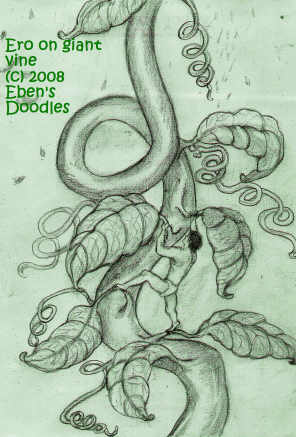
Still the vine stretched upwards, though the trunk grew slimmer and the leaves fewer. He found he could climb using only the trunk grasped in both hands, and he made more rapid progress. It was just as well he did! It was getting very cold, ice had formed on the trunk and leaves, and as much as he breathed in, he couldn't seem to get a good breath.
Should he turn back? How far would this vine take him? It seemed to be taking him out of the world! But where?
He had his answer as he climbed further on.
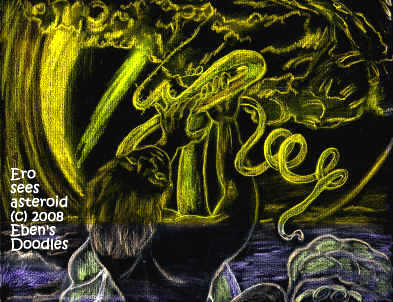
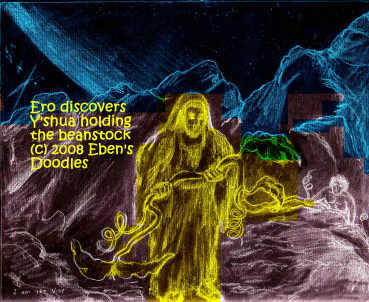
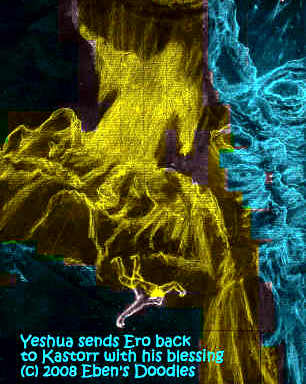
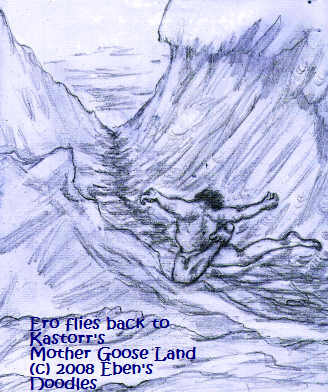
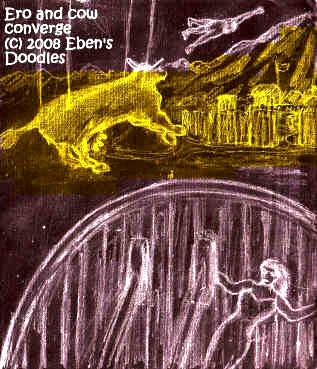
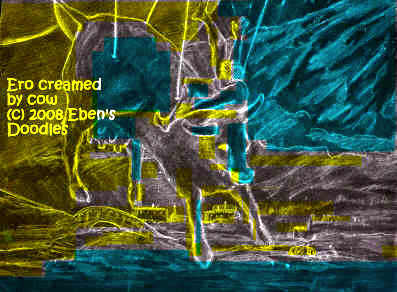
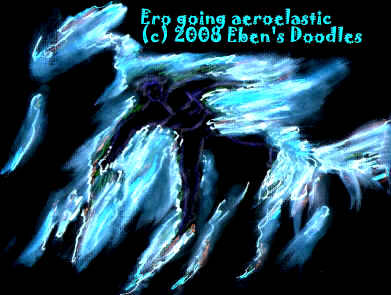
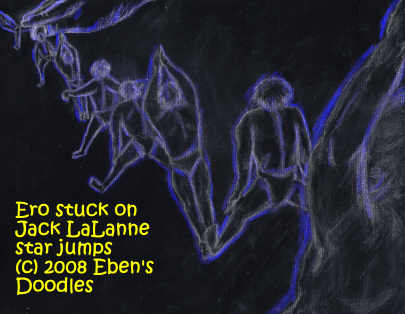
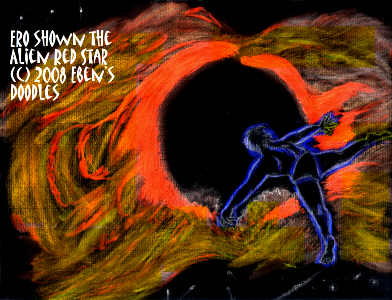
Loving the feel of real earth beneath his feet, he retraced his path on the steep streets to the waterfront, which suited him more, being a sea-loving Greek.



A cosmic Carbuncle, the Vampire-Stone, moved from Earth II to Earth I, as things get too hot for it in its old haunts. The Time Portal serves to give it entrance, as it answers the call, not of distressed cells resident in Marty Yeager, freshly killed and hidden in the forepeak where they kept the anchor chains of the Titanic, but of unbelief and faithlessness residing in the statue of Karl Barth (which contained some timecapsuled papers and writings by the author), the famed theologian of the mid-20th century. Vampire-Stone and Karl Barth, it was a passionate same-sex marriage from the first. These two malevolences were meant for each other. Zeroing in on the emanations from the statue and its nearly decayed but lucite-encased writings, the Vampire-Stone found a habitat it could use as a base for exploiting and overwhelming billions of people during the Millennial Reign of Yeshua.

What kind of god was he? The titanium-encased writings were found in an exploratory penetration, and they gave a most complete answer, though it was hard for the Millennialists to comprehend, as the concepts were so foreign and new. That it was all written down in a dead language was difficult and slowed the process, so it was good the Millennium was just that: there was a lot of time to spend on such questions, and the researches themselves lived indefinitely, so they weren't impelled by sickness, age, or other considerations, but could and did spend more than a century on the project. Just as slowly, the meanings were deciphered as the entire text was reviewed by many scholars, and then a translation was made that could be shared with the public that was eager to find out about the discovery.
She had been translating the ancient script into her modern Welsh language, spoken over virtually the whole continent formerly called Europa and once divided, in Karl Barth's time, into France, Spain, Britain (U.K.), Germany, etc. Those nations and the godless empire that had bound them together under the Anti-Christ in one last violent effort to overthrow the rule of the Lord God had long ceased to exist, of course, and their names buried and forgotten hundreds of years ago, beginning at the time when the Messiah returned to rule the Earth at His Second Coming.
But Rowena was not thinking of these dead nations or the Anti-Christ and his prophet who had been cast into hell, so much as this remnant of tidy, ancient script before her, speaking of a defunct but once flourishing "Switzerland", a tiny mountainous country that prized its isolation and freedom among the snow and glacier- capped crags once called the Alps. But the ancient wiseman did not spend much time describing the land of the Swiss, though he lived and wrote there for many years, producing his greatest works. He was called by his own people and times a "theologian." Theologians were a special kind of scholar devoted exclusively to the study of holy books and the Bible in particular, both Old and New Testaments. Karl Barth was one such Bible-scholar, and his writings were focused on certain questions he asked and attempted to answer in many volumes on the general theme of how he thought it was best to approach understand the Word of God, called the Bible. The right perspective, in other words, was what he aimed to lay out in detail, in books that numbered 4 million words in total.
Rowena found all of this intense study and highly nuanced and detailed "theological" argumentation so amazing! That they were so rich in those times that certain men could devote all their time and energy to studying the Word of God--when it was readily available to every one in society, being the most disseminated and published book in those early societies. What drove particular men to become life-long Bible scholars? Was it love of the Word of God, coupled with a driving passion to discover all of its riches of meaning and truth?
She saw little such men, or evidence of such a love for the Bible and a desire to inquire into its meaning and truth in the society around her, indeed, as far as she travelled, which was to the world center and Messianic capital, Jerusalem, every year to attend the prescribed Festival and Feast of Tabernacles.
It was regarded as a tiresome duty by most people nowadays she knew to attend the Festival, as they did it only to escape the well-known penalties for not honoring it--poor harvests, scanty rainfall, disease among the flocks and herds, miscarriages among women and animals, etc. Of course, many authorities now explained such things as purely natural things, a sign of the deteriorating natural order under the iron scepter and rule of the world's overlord and king of kings, Yeshua the Messiah. But she wasn't so sure--her parents had instilled in her an old-fashioned reverence for God and the Bible, and even now, as a graduate from a secularist-leaning School of Exhumation (as digging up the ancient pre-Millennial past cultures was called), she tended to handle any artifact relating to the Bible and divinity with trembling in her hands and a certain awe deep in her heart.
She kept such things to herself of course, as she had written her thesis on subhumation in the acceptable secularist mode, without a single reference to God being the origin of life and the center of civilization on earth, whatever names it was called in its various divisions, or "nation states."
What unnerved her, however, and increasingly made her both excited and feeling as if she had stolen and eaten forbidden non-kosher candy, was the unbridled spirit and voice of post-Christian secularism she found in Barth's writings. It was so much like the secularism that dominated her own time and society, that she felt a kinship, a certain identification, with Barth, even though he was definitely of an alien culture and a dead, condemned, anathematized society and nation--one representing a proscribed, fallen, anti-Messiah civilization that met its total destruction and eradication when Christ set foot the second time on the Mount of Olives just outside the eastern Golden Gate of Jerusalem. Imagine, such cultures had practiced infanticide for profit, while killing elderly people to save the health care costs! How barbaric and inhumane and cruel they were, while constantly calling themselves civilized people of the highest order! It was clear they were beasts in human bodies--but with technology they had risen to heights that made them imagine themselves to be gods! That pride and arrogance caused them to defy Almighty God and the Son, the Messiah of the Jews, precipitating their greatest folly, declaring war on God to the bitter end, their own utter destruction.
So why was she so drawn to them, when they were clearly so depraved and misguided and self-destructive a race and civilization? Why did it excite her and unsettle her at the same time? She was looking at forbidden things, she knew instinctively and also by her childhood training showing her the whites and blacks of rights and wrongs. But yet she identified somehow, feeling and seeing at the same time a likeness to what they said and felt and thought in Barth's time to what people were now daring to feel and think and even speak about openly in society. Jerusalem's hold was weakening, and the powers emanating from the Davidic throne on Mt. Zion had been waning for many years in fact; people were becoming more and more liberated and gradually shaking off Messianic Rule from Jerusalem, it was clearly apparent to all who lived in the Welsh-speaking regions. Someone even had lately suggested people ought not to put so much value on the "slaughterhouse religion" being practiced in Jerusalem and particular in the Messianic Temple! It was a most daring thing to say, and Rowena, like most of her class who heard it, were shocked almost speechless. But once said, it became common currency in an amazingly short time. "Slaughterhouse Religion," that stuck fast to all that signified the Messianic Temple and everything that Jerusalem represented. The sacrifices of animals that went on there, all supposedly depicting for the Millennial Generations the Atonement achieved by the Substitutional Sacrifice in the Death and Crucifixion of the Messiah in 33 A.D. of the previous world order? Well, they--along with the Messianic Atonement for mankind's sin and rebellion of the past world--were now viewd by an ever growing number of the world's peoples and empires as products of a backward, retrogressive, messy "slaughterhouse religion." It was all rather poor taste, in other words, and beneath their refined sensibilities--and they increasingly resented being forced by severe consequences and penalties to take part in them as a civic duty under Messianic World Rule.
Billions of people now thought and felt unashamably and even outspokenly in the same way, that the Slaughter-House Religion centered at Jerusalem was oppressive and out of step with the times, though she, a more timid, old-fashioned sort of person, was gradually learning how to think and feel the same way while fighting a deep-seated tug in the opposite direction.
Why had she volunteered to work on Barth's artifacts? After all, if it didn't suit her, she could have chosen any of a hundred other exhumed periods of pre-Millennial cultures and nations. Why did she center on the Karl Barth find?
Something in the night, perhaps, coming from far stretches of space and stars, had bewitched her and drawn her to Barth? Wild tales of her ancient Welsh culture told of such things--and were passed on from one generation to the next in children's nursery tales.
An educated soul, even one so old-fashioned as she was, so "traditionalist", with so much residual respect and reverence for the Messianic customs and Festivals, not to mention the Word of God, the Bible, still ought to be above childish, nursery-tale "bewitchment" or subject to the influences of similarly non-rational things. Or maybe she wasn't as educated and fact-centered as she thought she swast? She had to wonder about this. Perhaps, she ought to have stuck to animal husbandry, her natural gift, which led her to cultivating very fine, highly prized flocks of wool producing sheep, goats, chamois, and eveb some mountain-bred varieties of llama too. Weavers, merchants, and buyers from all over the world all knew her from her various, highly sought after woolens, which she wove herself on her specially hand-crafted looms of her own design. Why then did she leave her trade, which she found so satisfying and akin to her quiet-living disposition, for the vigorous, intellectual pursuit of Exhumation and Study of Ancient Pre-Millennial Cultures?
She couldn't settle on a satisfactory answer. She simply followed where she felt impelled to go. There was a drive in her that weaving and animal husbandry could not fulfil, and she thought it might be in mental development, study of ancient texts, and discovering just what the dead, ancient civilization had to teach those who followed.
Well, she ought to be happy then, at her work translating the ancient Dead German of the Barthian texts into modern Welsh--correct? No, she was not happier. She was excited, even tantalized, but not happier. It was unnerving, unsettling, the further she delved into the meanings Barth was attempting to convey. Yet she couldn't stop, though her instincts all cried to her increasingly to stop and put the work away, let someone else have it who wanted it more than she did, but who would that be? She herself was more passionate about Barth than anybody else in the field at present. The circle of fellow Exhumers and Studiers was small and select, really an elite of experts in that subject of inquiry, and she was ideal for the task--and so the Chief Exhumer had given her what she requested: the main body of work on the Basel excavation writings to translate, as much and as long as she wished to do the work. Others could come after her to resume wherever she chose to leave off, it was understood, but she found she could not leave off. The writing was gripping her very soul-- tighter and tighter! She felt a Greater Power than her own spirit reaching out and the long, ghostly, pale, bluish fingers of the Ancient Past, the Deadman's own bloodless hands were digging into her being at its core and squeezing the very life out of her!--yet she could not get free or drop the work, she was captivated by this supernatural force entangling her with almost a convulsive rapture, she was forced to continue, though she was growing very frightened, feeling it might well kill her before long if she didn't make a violent effort and somehow wriggle out of its vise-like grip and escape.
Was this what the Ancients of the lost, dead civilizations before the Millennial Kingdom Reign called "addiction" or even "psychotic fixation" or the more vernacular "madness"? Whatever it was, she was helpless in its clutches, she found, and sensed it was too late to get free. Strangely, she no longer cared very much about her freedom. This attraction had turned into an intoxication, even to the point of rapture. In other words, Rowena was "hooked bad."

She knew children loved to climb their backs, and the beasts wouldn't shake them off, or grow annoyed and put their big feet on them. But still, it was not safe to do so, as the beasts uually had small heads for their immense body size, and that meant their eyes were small and their vision limited. Try and explain that to fun-loving little boys! She knew they would always be playing with the Grazers, no matter what their parents said--and take their chances one day the poor beast wouldn't see what he put his foot on. It was tragic when that happened, but it wasn't the beast's fault, and so they just had to be more careful to warn the children not to take such chances and hope they obeyed.
She herself was glad she hadn't children, and remained unmarried so long. She could still choose to marry if she found someone suitable, who wouldn't interfere with her intellectual pursuits, but she rather liked her independence of men. And what would she do with children under her feet? She loved her animals and now her work as an Exhumer. Everything she had done previously to Exhuming seemed inconsequental in fact. Barth was everything to her! Everything! She couldn't get enough of his wonderful philosophy! It was so liberating to her mind and soul. What puzzled her was how this spiritual giant could be writing so many books, and yet the world he lived in took such little notice at the time, though he received quite a lot of prestigious honors from various universities and colleges. If only they had given him the attention he deserved and followed out his teachings to their logical ends! Wouldn't their world have been much better for it, and possibly have escaped destruction? Yet they continued to co-exist with lesser ideas, with lesser expressions of the intellect and man's spirit, and the pathologies of the whole culture overwhelmed them in the end and destroyed them.
Now it remained for her to bring the liberty and truth of Barth forth for her own people to read and learn all the things he taught an earlier mankind.
What things? a voice seemed to ask her as she turned her feet toward the site of the diggings.
"Why, for instance, that God is infinitely transcendent, infinitely beyond human grasp and understanding! That thought alone could be the subject for an entire volume! It was a most revolutionary thought. It was earth-shaking, in fact. Imagine such a God as Barth conceived Him-- it would liberate the whole population of earth from the degrading, enslaving, autocratic idea that God could be touched and spoken to and whom they needed to deal with problems on a human level. All that interference and meddling by the Absolute was quite impossible, and unnecessary. God, since he was Absolutist, was infinitely removed from humanity, being infinite being. Man was limited being, there was no denying it, and therefore that was all he could possibly know--finitude and the humanly knowable world. There was a gap between God and man that nothing could bridge--nothing whatsoever! Even God could not bridge it--as then he would cease to be less than Infinite Deity. To be personal with man, then, was logically a contradiction, by the very definition of God the Absolute. To become personal, God would have to give up his own essence and cease to be Infinite God!
This liberating, thrilling thought took her all the way back to her quarters. She paused before going in her private office to touch the face of Barth, and the coolness of the stone made her tingle with joy. How much she owed this great man! He was setting her free from centuries and centuries of shackled thought and bondage to a knowable, personal, demanding Godhead. Now she could exist on her mundane human plane, and God would exist on his infinite plane, and she could contemplate Him, while remaining absolutely free, without being forced to worship and praise and give offerings and make the yearly pilgrimage to the Messianic Temple in Jerusalem at the the Feast of the Tabernacles.
Absolutely free as she now recognized herself as a moral agent, could she refuse to go? What would happen if she didn't? She had always gone out of solemn religious, traditional, and family duty and fear of God, but now she wanted to exercise her newfound freedom, whatever the consequences. After all, her intellectual integrity demanded that she not compromise what she had discovered: man is a free agent in the universe, created so by God the Absolute who could not deny His own infinite apartness from Creation.
Then a thought came to her that clinched the entire question for her: how could this Son of God reigning in the New Jerusalem over the entire earth possibly be what He was claimed to be--the Savior and Lord over all people and the earth? God could not have such a Son in the first place! An Absolute, Supreme Being could not produce an intermediary who was God too! God had no such Son! What was the logical conclusion? This "Christ," Yeshua, the "Son of God," "Messiah of the Jews," was nothing but an imposter!
With this conclusion, her mind closed on the question like a steel trap. There could be no other rational, logical conclusion! It was settled. Yeshua was a vast fraud perpetrated upon all humanity and the whole earth, for hundreds and hundreds of years. But something had to be done. Mankind was enslaved by a lie. Mankind was enslaved to a false God, a mere man made up to be God.
What should be her response? She had to think long and seriously about that. She left her work and went on yet another meditative walk.
This time she did not go along the lakeshore, she went to the Basel excavation, and gazed upon the revered statue of the Great Ancient, Barth.
Since this was the very man who had helped set her free beyond anything else she could identify, she felt great gratitude toward this dead giant of intellect and truth. It was a gratitude that caused a kind of worship to well up within her heart, and so she found herself praising him and even praying to his dead spirit that still lived and flourished in his immortal words and writings.
"O Great One of the Ages, you have set me free from the shackles of the Age, from the false one who sits on the throne this day in the city of Jerusalem on the mount, who has enslaved all men, and whom must be exposed and driven out from the temple and his shackles dashed to pieces! Great One, you have inspired me, your daughter, to begin the noble struggle to fight for the freedom of my fellow men. They are lost in darkness, slaves who do not know yet they are slaves, but I know the truth, and I will never compromise with the darkness and the lies of the imposter. I promise you, O Great One, I will remain true to your teachings, even if I should suffer early death at the hands of the imposter's many armed men and servants. Give me strength of will and resolve, O Great One, that I will not relent until the innocent, oppressed masses are set free, to be once again free moral agents as I am lately become, and no longer abject subjects of a false son of God, when God being Absolute and Supreme and Infinite could never have birthed a son. In honor to the Absolute God who reigns beyond the universe, in honor to you, O Great One of Tel Basel and the Ages, I commit myself and all my endeavors in the coming days. Amen!
At first, he easily adjusted to the change, the loss of the mast on his mast-bot. The base remained, and it served well enough, a free-flying saucer. He was able to see large parts of the Millennial World with it.



He saw incredibly fearsome winged creatures, one on the right and one on the left, standing guard along with some winged soldiers in full battle gear. He couldn't turn back now, his eyes were beholding things he had never imagined, and at the risk of his life he wanted to see more if he possibly could.

He flew closer, and to his surprise the houses or structures on the mount continue to grow in size, increasing as he was decreasing.
Whatever he looked at in particular, the name of it came to his mind without Wally's popups. He saw on the left, "Palace of the Alabaster Box." To the right on an upper level he saw, "Palace of the Wise Virgins." Above another level or two was a Menorah, the "House of Israel." Beyond that on the left was the Triumphal Arch of the 144,000 Martyred Witnesses. Above that rose a candle from the Menorah whose top he could not see, that was "Yeshua's Candle," he was somehow informed.
When he moved closer, however, guardians moved to meet him. They were all giants. One came and spoke for the others to Ero.
"Tsaddiquim greets you! We are the Guardians fof the Seven Churches of Asia and now the New Jersualem. The others are named Nesu, Ashre, Chesid, Smichu, Pallet, and Sether.






Wouldn't it happen now, after the most wonderful sights and experiences at Mt. Zion, the New Jerualem, still brightly glowing his mind?

SEARCH took him to various options.
But he couldn't find anything that answered to his particular dilemma.
Then he thought of something. He pull some long fibers from a palm trunk, that hung long and hairlike in huge tufts, and tied on the plates from the mast base, and then as he rose up, he tried to maneuver and even fly. But he couldn't coordinate, and soon found he was crashing back into the vegetation.

As he looked about, he noticed some things however that gave him some hope of improving his mobility. He found that the native winged fauna and even the huge insects such as dragonflies were not at all hostile to man or unfriendly to him. They were so tame, in fact, he thought he could ride them. He chose a dragonfly, since there were no dragons in the vicinity. Magnificent fliers and huge enough to carry him, they could take him anyplace he wanted to go.
Catching a dragonfly was easier said than done, he discovered.
Skittish creatures by nature, though fearless, the dragonfly he was approaching flew off the moment he showed any interest in it. He looked around for another. Fortunately, there were many, so he didn't have to look long.
He had to find someway to catch them them when they were sleeping or not paying attention, but their globular eyes were so multifaceted, and lidless too, he knew they could always see around them 360 degrees and never be caught off guard.
He asked HELP, and Wally had these suggestions:
CUT, PASTE, OR DRAG AND CLICK ON SPOT WHERE YOU WANT YOUR ICON PLACED.

The medallion lifted off the dome and fluttered down to the sidewalk, where it lay momentarily, while it was being booted up.

Ero noticed he was being followed. Was it a bird? A dragon? It had winglike appendages, a round flat body, with a hat like head.






His many brothers and sisters were always watching him, he couldn't find a single place where he could be alone and enjoy some privacy. What with his father's drinking, the household was a shambles, no order to anything. With his brothers rough-housing continually, or his sisters arguing over the least trifles right into the late hours, he could hardly endure sleeping there. Fortunately, days of bad weather that forced him to stay indoors were few, as he went out walking and rambling, regardless. But it just wasn't the house stuffed with squabbling, disorderly family. The time he lived in, the society around him, also stifled his spirit. It was a time of vast unquiet, noise, confusion, and demands of all kinds. There was no escape for the soul and spirit of man--even God was denied, and that refuge cut off. The important people all seemed to believe science now at last had the ability to identify all the answers, reasons, and causes of life--it was just a matter of a few years more and there would be no more questions worth asking, for Science would answer them all!
That stertorius declaration voiced by various mouthpieces of the Establishment galled Alfred's soul and spirit and mind, as much his stays in the old, lake district house. It made him feel almost claustrophobic. Oh, if he had only been born centuries before! Back when life still prsented vistas of the unknown yet for man to conquer! But now what was left to conquer? What indeed? Dry academicians, their moustasches stiff with tobacco smoke, claimed to know everything, and nature was utterly subdued, tamed, explained. Nature was a sort of trick dog now. These people made Nature to do amusing tricks for them in the laboratory and the lecture room. See! they cried, winking at each other. Bloody nature's under our complete control!
Well, Alfred knew they were wrong! They couldn't be more wrong, in fact. He knew there was so much they were missing, which, as Shakespeare said so well, they had not even dreamt of!
Of course, they all scoffed at such a suggestion, that there was something left outside their neat equations. Who can teach us anything? We are the ones to teach YOU!
How he detested such men. They had buried Mystery-- along with the Middle Ages and all adventurous, challenging times when young men, like the famed Argonauts, launched forth on great journeys of exploration and discovery.
Yes, they had ruined it for the young men of Britain! All the sparkle had been drained from life. Why live?--just to repeat their drab careers?
To get away from the house and just as much from the 19th century, he bolted out the back door and ran down through the unkempt garden. Without stopping, he climbed the wall and went walking alone in the hills he liked best in this Lakes District on the western coast. Forgetting how much time he was spending out there, he crossed fields and roads alike, climbing ever higher for the views.

How he hated the thought of returning to that old house where everything had seemingly lain in its place forever, begging not to be disturbed!
After being closed up so long during the winter, it smelled musty to him, and needed airing out, the shutters on all the windows thrown wide open. Even then, that musty smell lingered. And when he opened a drawer of any of the furniture, he smelled camphor and ammonia from the mothballs!
It took hours to clear all that out of his lungs and soul and feel free and alive again, with something to hope for.
He carried a paper and pen he thought of something to write, though he would need a lamp soon to see what he had written. It was late in the day, and the dusk was deepening, and the first stars beginning to shine. His family was used to his random ramblings in the country, so wouldn't worry too much, he knew.
As he stared upwards, he could make out Orion the Hunter, and looking at it some thoughts formed that he felt he must try to capture on paper while there was still enough light for him to write.
which is the second in a line of stars
That seem a sword beneath
a belt of three,
I never gazed upon it but I dreamt
of some vast charm concluded
in that star
to make fame nothing.
"Were I to find a ship of fire, perhaps a speed like light itself,
which flies from star to earth and sun to planets, what would I see in that far place?
Perhaps a cavern of palaces,
stars forming thrones beneath massy domes, so I might wander there ever going from chamber to chamber?
"What precious things would I find within those halls, that waited there in glorious chests-- treasures of the universe, hidden since our Word first spoke these worlds' birth?
"At death at least, will my spirit fly, to realms, domains, and empires high? Will I find scepters glowing bright, many-colored and powered with pride?
"What Titans dropped all in their haste, their powers, dominions, all gone waste?
What Power o'erturned theirs so great, Greater still,
that cast them into depths of space
to wander in utter dark disgrace?
"Secrets of the stars must await,
woven ingeniously in that mystic belt!
A tapestry of destiny--
and a Door to crystal Wonders--
would we have the right key we'd see and know and those wonders embrace!"
Now those unfinished verses were not exactly yet the polished masterpiece "Merlin and Vivien" that Tennyson's contemporaries knew, but an amplified version by Eben, but there is perhaps more to think about in his vision than even he dreamt or divined, and divined correctly as it would much later be discovered, through his immense imagination.
Should we give you now Earth II's version? Are you ready for that much revelation? Return and see if we would hazard a guess whether you are, or give you the benefit of a doubt.






Their house now promised to be one of Pompeii's most luxurious and biggest. Tully was used to workmen in one room or another going about their work as masons and painters--and he made friends with most of them.
After his Greek pedagogue was finished teaching him and went to his room, Tully ran to the work in progress and had fun talking to common workmen and hearing their crude stories--he thought little about the cause of their being there.
One painter painted some hairy satyrs--goat-like men holding naked nymphs--and his father saw it and had him paint over it with flowers and fruit basket, olive wreathes and such trifles. Tully had been in other houses and seen satyrs, so why couldn't his home have them?
He didn't dare ask his father, so he asked his mother. "You're not old enough to look at such beasts and their naughty antics," she smiled and replied, though he was nine at the time. "You must wait a bit more, and then your father will tell you."
Well, he didn't wait! He ran first thing and asked the workmen. They told him everything! One even drew what he was talking about, which made Tully's eyes widen and his mouth hang open. He was astounded. That is what men did to both women and even other men? His father came back in just then, saw what was going on, called the house guards and had the workmen thrown out, with their tools thrown in the street with them.
At that moment a friend of his father's came calling, saw the disturbance, and Tully creeping behind the pillars heard his father explain what the men had done, inflaming his young son's tender ears with their lewd orgies with prostitutes.
His father's friend made a comment that Tully never forgot, though he didn't understand it. "They are but ignorant men, they are slaves to their base desires. After all, this city is just another Sodom or Gomorrah."
"Yes," his father agreed. "But not here, not in my house! We Samnites believe in virtue and noble, clean living."
"You are a good man, and a good father, Cassius Septimius," the friend declared. "You will always have my business, even if my God is not yet yours, and you still throw incense your vain Greek and Roman idols, and even the emperor Vespasianus as a god, though he is a mere mortal of flesh and blood like us!"
"Be careful, dear friend!" his father chuckled. "The Emperor may have a spy nearby listening to us, and throw us both in the arena with lions and leopards like they are doing the followers of Christus! And if you should ever persuade me to give up my gods for your one nvisible Jewish God, why I would lose all my business in a day--since you Jews are too few in this city to keep my business prosperous!"
Whatever was said after that, Tully did not stick around to hear, for they were coming his way, and he had to run quick, or be caught eaves-dropping. He was frightened now. After the affair with the naughty painters, to be caught listening from behind the pillars to grown-ups, he feared his father would severely discipline him. He ran to his mother's room and pretended nothing had happened. After a while, he went to his own room. He climbed up into his window and sat gazing out at the mountain.

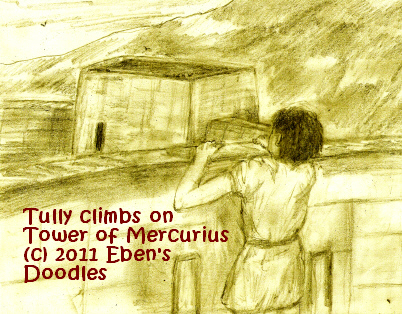
His father was talking to his friend, and only later did Tully see him when they had dinner, which was set up on the terrace in a garden, the triclinium for dining outdoors. The subject of what happened to the workmen did not come up, fortunately for Tully. He hardly knew what he was eating, wondering all the time what his father might say. Strangely, his father never breathed a word about it, nor the part he had played.
Instead, his parents discussed something else. "I'm sorry your dear friend is not here to dine in our new triclinium," his mother said. "Didn't you invite him, Cassius?"
His father shrugged. "But you forget something important, dear, which they, being Jews of strict religion never forget."
"What is that?"
"They cannot eat our foods prepared as we prepare them. Meats and dairy foods must be handled and cooked separately. They use different sets of utensils, that they use to prepare and cook with. Even the garum sauce we use and sell, they cannot use. So we make a special garum in the factory without using unscaled fish. For the Jewish customers we have, only scaled fish will do in the sauce. I thought you knew that. We would have to prepare and cook their way, separating meats and dairy foods, using separate sets of utensils, pots, and dishes. They cannot even be washed and rinsed in the same scullery tub, nor can the same towel be used to dry both sets."
"Yes, I think I heard some of this before from you," his mother replied wearily, "but I never understood it, so I forgot it. I also recall you said they never eat pork. How can you have a tasty dinner dish without some pork?"
"Well, the Jews are very strict about their dietary laws, which they believe their single, invisible God, whom they decline to name out of reverence, commanded them to follow, but they are good people for all that, and I don't believe they mean any effront to us. My friend and good customer, Moshe bar-Shlomo, who always pays on time, isn't at all anti-Roman or a hater of our ancient Samnite customs, as some people say who would give them all a bad name--the Jews, I mean.
I could trust him in my home at any hour, day or night. I can't say that about most people we know! Even our families and blood relatives--I wouldn't allow them free run here!"
Then they changed the subject to something about the layout of a new garden and its decorations.
What a relief that was! Yet he never forgot that "Sodom and Gomorrah". Were they cities? The names were strange and foreign. They didn't sound like good places to be. What had happened to them? It was a mystery to him, and he didn't dare ask his parents. He had kept quiet and escaped a whipping, hadn't he? As his teacher said in Greek, "Don't ever tempt the gods, boy. If you do, they will crush you like my shoe heel crushes a bug!"
That was good enough advice for him! And another thing his pedagogue said: "Best leave sleeping dogs lie."
So too with the quake that destroyed their house six years before he was born. His parents did not speak of it, so he never really thought about the cause or connected it to the big mountain a few miles to the east of the city. His pedagogue, taking him outside the walls to teach him names of wild plants, herbs, trees, and even rocks that Aristotelius had written about, noticed something and pointed it out to him--the city was perched on what had once been a swarming mass of melted rock.
"But where did it come from, Teacher?" he asked.
His teacher pointed to the north, toward the mountain, Vesuvius Mons!
Tully couldn't believe it. "How could it melt rock and spit it out like the Sarno all the way here? What would melt the rock, Teacher?"
"If I take you to the goldsmith or any other smithy, he can show you that fire, when it is blown hot enough by the bellows, can melt rock, until you can pour it like water!"
Tully was dumbfounded. He looked again at the mountain. "But I see no fire on it. No rock is being melted there."
"Oh, but just wait! It may start a fire and melt rock again. Other mountains, one far south of here, is smoking and burning. It is melting rock. It is that sometimes these mountains sleep for a time, then wake up and suddenly spew fire, smoke, and melted rock."
"Not OUR mountain," Tully replied to himself. "It's always been sleeping like an old dog since I was born. It's not going to wake up for a long, long time yet!"
So he forgot about his teacher's ominous words. Life wasn't that serious! Pompeii had everything a boy could want--and much more! It was always changing, being built in all the time since the last earth shaking. It was again a wonderful city. Theaters, gymnasium, gladiator school, huge swimming pools, arena, forums, markets of all kinds, grand temples, which were thronged with people from the cities all around and even from far parts of the world. He had learned several languages already, among the many he heard spoken by visitors.
With all this to interest and entertain him and his friends, why should he worry about the clouded mountain towering in the near distance? It had always looked that way since the day he first saw it--and hadn't changed, nor had it ever hurt anyone he knew.
He had climbed the lower slopes with friends too, and there was nothing dangerous about it, other than maybe some snakes and wild dogs. Much was covered with trees and plants, it was nice up on it. The bare, sharp-edged rocks and black, cinder-strewn slopes above the trees were harder going, of course, and the wind whipped at you, and it could get cold. Cliffs too--but they didn't venture to climb them, though some older boys claimed they already had done it and even bragged about how they had made it to the very top--though he didn't believe them. Someday, he vowed, when he was a year or two older, he would really do it! He just turned eleven, so he knew he would grow a lot soon and be a big, strong boy, able to reach the very top, where the eagles soared.
One day his father came in during the tutoring session, dismissed the teacher, and took his son along with him as he made business rounds.
Tully was tremendously excited. It was like a holiday, only better than the ones for honoring various gods and the emperor, since his father was introducing him to his business affairs, just as if he were a grown-up! This was just as good as watching the gladiators train. which was strictly forbidden by law of course--but boys can always find peep holes to watch things that would shock even adults.
He already knew the businesses of the tradesmen that rented rooms where the house fronted busy streets--the shop that sold hot foods, the tavern, and the taberna.
First, his father took him to a number of his garum customers, right into their splendid houses that were normally closed to anyone but select friends, family, and household servants.

"Whose baby was it?" Cassius S. asked his son. Tully had no idea. "Well, the king devised a sure test to reveal the true mother." "How, pater?" "He simply ordered a guard standing there to divide the child with his sword and give half to each. Immediately, as the wise king foresaw, the true mother was revealed, when she fell down in tears before the king and pleaded strenously for the child to be given to the other claimant, despite the fact she had approved the division of the child, since the king wasn't going to award her the whole child.
"No true mother would hesitate to give her child up to save him," Caassius instructed his son, to drive the point home. "I suppose so," said Tully. "But what happened to the other woman, the one who lied?" "What would you think happened? She stole her friend's baby, then lied before a king to keep him. She committed two crimes at the least, even showing contempt to her king the judge by seeking to deceive him. Of course, he ordered her to be severely punished."
Aaron's father entered the atrium with Aaron at that moment, catching Cassius's last words. "Ah, I see you are showing our great wise king and the testing of the two mothers to your son! He should profit by it."
"I am not sure he is yet old enough," Cassius replied doubtfully eyeing his son. "But I know I have profited. Your king proved himself the wisest man on earth. If only we had emperors as wise as this Solomon of yours!"
Aaron's father cleared his throat. "May I caution you, friend Cassius Septimius, for that is daring talk even for you, a nobleman among the Samnites. If I, a Jew, were to say the same thing, and it was reported, I might find myself in deep trouble even though I spoke it in my own house!"
Cassius nodded. "By Jove, I will not mention the emperors again for your sake. And please forgive me. I just misspoke, naming my god within your own walls."
Aaron's father inclined his head, accepting the apology.
All this was boring talk to young boys. "Could Aaron go with them?" Tully asked his father the moment the talk lapsed. Aaron was his best friend, he added.
His father consulted Aaron's father first. His wife came to greet them at this time, and so she entered into the matter. Since this was a special outing, and they felt they could trust their son with their friend Cassius Septimius, they approved it.
"He will learn something important about business," Aaron's father remarked, smiling. They escorted Cassius Septimius and the two boys to the delivery wagon, and the driver took them to the next customer, the House of the Vetii
It wasn't large like other houses of wealthy people, but the two merchants, Aulus Vettius Restitutus and Aulus Vettius Conviva, had spent huge sums to decorate it with wall paintings, statues, fountains and pools.
It was like a wonderland, a picture-gallery of all the best heroes of Graecia and Roma and their exploits.
But, strangely, Tully's father wouldn't let them look at certain paintings in the entrance hall which featured Priapus, the god of fertility himself, but everything else in the public rooms were allowed them to view while Aulus Restitutus conversed with Cassius Septimius.
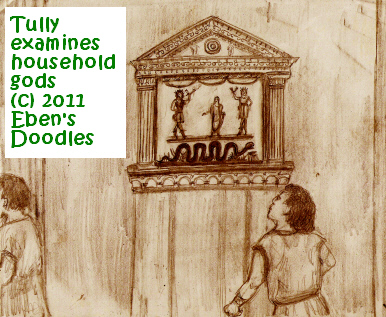



"I can't look, it's an abomination, it's Sodom and Gomorrah in there!" Aaron blurted out. "I'll be defiled!"
Cassius S. then saw the wall-paintings, then glanced back at his son and little friend who was so upset.
"Son, you know better than to look at such things! They're not for children. I shall deal with you later."
He turned to Aulus R. "My son has misbehaved, so we are leaving now. I regret this happened. I thought they were old enough to accompany me--"
Aulus R. laughed. "I forgot to tell you this room was repainted last week, that's all it is. Don't hold it against the boys, Septimius! Lighten up! Boys will be boys. They won't see anything else that will offend your propriety. I beg your pardon for the naughty little bacchantes of this room if they offended you, but I got so tired of the floral wreaths and little birds, I told the painters to do as they wished with it, just so it was amusing to look at, and not so dull."
"Yes, I see they did as they wished!" Cassius Septimius observed wryly. "Just the same, I think it is time we were going. Good earnings, Aulus Restitutus!"
Back at the wagon, Cassius S. turned to Aaron. "Run along home now," he said. "Can you find your way, Aaron?"
"Yes, sir! I can!"
Aaron scampered off, leaving his glum-faced friend to his fate.
"You come with me," the father said to the son.
"You've shamed me before my patron and also the son of my friend the Jew!"
Cassius S. led him into a small open-doored warehouse, and found a notched measuring stick for the sacks of wheat and other grains.
They emerged a little later from the warehouse, Tully's face red and streaked with tears.
"Now will you behave, or must I send you home?"
"I'll behave, Pater! Please let me go with you! Don't send me home!"
Cassius observed the tears, and shook his head. "Your tears will not move me as they do your mother, but I will give you another chance. Just don't treat it lightly!"
They continued to the Forum, and the wagon, now empty of long-necked garum sauce jars, was sent home with the drayer.



What would Aaron's father say? Aaron must have told him everything, Tully thought, and now...
He would have liked to run, but he couldn't--his father held his hand fast.
With his head down, filled with dread, he waited for Aaron's father to tell his own father what Aaron had said. Wouldn't Aaron make it worse than it was? And wouldn't he get whipped again when they got home? But Aaron's father started talking business.
Tully waited, hardly able to breathe, but still not one word about him.
Finally, his father gave his hand to Aaron's father to shake on their joining in a new business venture.
"I will be happy to join you and finance half the cost. You talked to the right official. How did you get close to him enough to receive your offer. Imagine that, we'll be supplying the garum sauce to the officers of four legions! The gods of fortune have smiled on us and our houses this day!"
"No, not the gods, my friend, there is only one true God. He is the one who smiled on us, and gave me entrance in the Capitol to the high official I needed to see, who had the power to give that contract, and then decided I was the man for it."
"Yes, I know, you call your god of the Jews, strangely enough, the 'God of Abraham'--He is the one who favors you and blesses you and gives you such a sharp ear and eye for business."
"It is the truth, you know it is the truth, Cassius. You should have been there, seen Pompilius's vestibule and atrium packed with the most important men of business, all seeking what I alone walked away with! Our holy scriptures say, 'God promised Abraham our forefather, I will make you into a great nation...I will bless those who bless you, and whoever curses you I will curse; and all the peoples of the earth will be blessed through you.'"
Tully heard his father heave a deep sigh.
"Speak no more, friend, I am almost persuaded to become a believer in one God and worship your God! What sane man would not choose such blessing as you have on you over curses? But should we speak so openly of your God here? We might be overheard by an enemy of your people. I am Samnite, born of the Samnite aristocracy, and my people were civilized and city-bred, flourishing here for centuries before Sulla's legions put down our last resistance to Roma. Freedom was a nice thing, but we have been under Roma for a long time now and have grown accustomed to the Roman yoke on our necks and shoulders. You Jews refused to submit wisely as my Samnite forefathers did, so Roma destroyed your country, your temple, and enslaved your people by the hundreds of thousands--all those they didn't slaughter. Surely, Roma has a curse on her now for that, if your God is still the God you say he is."
"God never changes, if that is what you are asking! Oh, deep in your heart, you are a God-fearer, Cassius! Know that the One True God has his eye on you!"
Tully's father was edgy, and looked around. "But will he protect me as he protected your own people and country? Look how your own people the Jews were destroyed, and your temple burnt, leveled to the ground, and teams of oxen pulled plows over the cleared earth where your great holy city once stood. Why didn't your God deliver you from our legions, and the fury of Vespasianus and his son Titus? They were worse and more merciless than even Cornelius Sulla was to our city. He could have destroyed us, but refrained, reducing us to a colony but allowing some vestiges of local government here of our own. Is that what the blessing of the God of Abraham brings his people--total, merciless destruction?"
"No, my friend, that was punishment for transgressing his holy laws; but still his covenant with us holds fast, he will never forsake us utterly, he will bring us back to our own country, he will plant us there and make us flourish once again, as in the days of our greatest kings, David and Solomon his son."
"Ah, your great namesake, the wisest king on earth whose proverbs you gave me in a book, which I keep by my bedside. Thanks to him, I will not grow slack at discipline and spoil my son, like I see other fathers doing with their sons in this beautiful, rotten city of ours."
After a few more words, bar-Sholmo asked for a favor. "Certainly, what is it I can do for you!"
"My wife and I think so highly of you, Cassius. Here is a key to my house. We must leave and go to my father who lives in Stabia. He is very ill and may not live long. I am leaving only our household servants. If we are gone more than a few days, would you go and look in, to see if things are in order? It would be a great relief to our minds if we could see to my father and not worry about our home."
"Of course, I am happy and most honored to render this service to you, good friend!" Cassius replied, taking the large brass key handed over to him and attaching it to his belt. "When will you be leaving for your father's home?"
"As soon as I found you and finished talking of our business, now I am free to take my wife and son and go. I am anxious to be at father's side as soon as possible. As his eldest son, he depends upon me to handle his final affairs."
"I am so sorry to hear of his illness, and would pay for prayers for him at the temples of Jupiter and the others, but wouldn't offend you, so I will just commend him to your God's care, and not detain you a moment longer."
Exchanging the customary Pompeiian "Good earnings!" to each other, they parted, Aaron's father hurrying off to Tully's great relief, without one word about Tully's misbehavior in his son's company to disgrace him.
They proceeded toward the far end of the Basilica, toward the equestrian statue of Caesar Augustus that stood in front of the Tribunal whee civil cases were handled.
"I have to check on my petition to the emperor, son. Remember how I told you we lost most of our lands and vineyards, and businesses--the laundries, bakeries, and cloth weaving, when Sulla took them? All we were left was our garum manufacture and the little shops round our house. Remember the great house I took you to, to see the floor picture of Alexander the Great fighting Darius, king of Persia?"
"Yes, Pater! I liked it very much! May I see it again?"
"Well, perhaps. Anyway, that house was built on our property with our lost fortune. Sulla is little thought of these days. We may get back some things back if the emperor approves my petition. Our family has tried for generations to get compensation, but we could never reach the emperor's attention, whoever the emperor was each time our family applied with a new petition and the necessary bribes. But our city has risen in imperial favor since then. Vespasianus has his temple here, and a villa on the mountain slope. The Governors erected an arch to Germanicus and numerous statues of the members of the imperial families adorn the public places. Noble Romans have their villas here, sparing no luxury on their embellishment. All this was bound to help us in my suit, son. We cannot be ignored as in former days. Today we could even hear the disposition of the case."
Tully wasn't sure he understood all this adult talk, but he caught parts of it.
And Cassius Septimius was right, he not to disappointed this auspicious day. They had just climbed the finely made wooden stairs to go to the entrance doors when four men came out of the Tribunal. Cassius recognized two of the men as the city's duumvirs, the dual Governors of Pompeii. Governor Publius Lucanus Torenus spoke for his peer as well as the others, greeting Cassius with a beaming smile and outstretched hand.
"We sent messengers to fetch you, and here you pop up right in our path. WE were on our way to the amphitheatre to inaugurate the gladiatorial games and wanted you to come with us and throw the baton to the lucky man among them! Well, indeed Augusta Fortunata has smiled on you, Cassius Ancus Septimius, my noble Samnite friend! The Lord Chancellor of the Court here by our side took your petition to heart, for he is fond of our beautiful city and wishes to do her some great favor, as his daughter and husband have a new house here. He presented your case to the emperor, and he read the paper and declared he saw the justness of your appeal. You shall have full compensation for your family's great losses due to General Cornelius Sulla's depredations. Our city's aediles have been sent an order for an inventory and audit of the confiscations. When the imperial treasury officer receives it, you may draw on the treasury in Roma to the fullest extent to compensate you. Only you cannot have the properties returned, as they have passed to successive owners who had nothing to do as parties to Sulla's unjust robberies."
"Pater, you're hurting me!" Tully gasped, trying to twist his hand free.
Cassius realized he was gripping his son's hand like an iron vise, he was so overwhelmed by what the City Governor was declaring to him.
He let Tully go, so he could rub away the pain. "Pardon me, son, I can hardly believe this much good news--"
He turned back to the smiling Torenus.
"Excuse me, Governor, I am somewhat shaken by such good fortune falling so suddenly on me, I nearly crushed my son's poor fingers."
"Yes, I can understand that," laughed Torenus. "But now our other suits can go forward on the tail of your successful one. We may even be awarded self-government, and with freedom rise to become one of the greatest emporiums and port cities of the empire, as wealthy and great as Antioch or Alexandria or Athens and Ephesus. There will be no limit to our expansion and trade and industry. What was hard for us before this time in our inferior status imposed by Cornelius Sulla, will be made easy in the days to come. Your success is the golden key that opens the door to a glorious destiny for our city! What a day this is to celebrate, both in your home, Cassius Septimius, and throughout the city. We Governors declare a holiday to be celebrated four days hence, so that preparations can be made beginning now. You, Cassius Septimius, will ride with us in state chariots through the Arch of Germanicus and receive the people's acclamation. In the Forum, at the Temple of Jupiter Capitolinus, you will lay a wreath of gilded laurel--"
After the officials were finished giving Cassius instructions and congratulations, the governor again invited him to do the honors at the amphitheatre's new opening, after a ban of the gladiatorial games for ten years by Nero and the Senate due to a bloody riot between the Pompeiians and the Nucerians.
Cassius respectfully declined. He had some urgent matters at home to attend to, he informed them.
Keen disappointment showed in the officials' faces, but how could he help it? Cassius thought. Going to the amphitheatre to officiate and watch the fights, which would be bloody ones, appalled him, and he could not tell them that. As Romans they wouldn't understand or appreciate at all what he felt about such "sports." He would never forget his last visit, how the city had staged an elaborate tribute to Vespasianus and Titus and their crushing of the rebel Jews of Judaea. A huge model of Jerusalem was constructed, the golden temple of the Jewish god most prominent, then gladiators in Roman army uniforms fought Jewish rebels, other gladiators in Jewish robes and beards. A lot of blood was shed in this mock battle, but that wasn't the worst of it. When the battle was over, and the Jews crushed and the city and temple set aflame, surviving Jews were strung up on long rows of crosses erected to form a giant Star of David. He and other prominent citizens were then to form a procession and shout praises to Vespasianus and Titus for their great victories, waving banners while the tens of thousands in the stands celebrated. But that wasn't the whole story as it developed. Gladiators posing as Jews on the crosses were stripped naked of course. He had expected that. But when he saw he saw Pompeii's highest officials and chief citizens all joining in making the most vile, lewd fun with the naked "Jews" on the crosses, it was so degrading a spectacle, he drew back. The crowded amphitheatre was roaring with laughter and could not get enough of watching their leaders make beasts of themselves.
These were civilized men? he marvelled as his fellow Pompeiians disgraced themselves for the sake of the crowd's amusement. Nay, they wern't civilized men, they were satyrs of the nastiest sort!
How then could he explain his real reason for declining their invitation?
After expressing their disappointment and failing to induce him to go with them, the officials departed.
Cassius S. led Tully away with great relief, since he had stood his ground and not returned to the scene of such monumental indignity.
The temple of Vespasianus was nearest them. It was every Roman citizen's and subject's duty to honor the emperor's divinity and image, and Cassius Septimius was a good citizen of Roma, and hadn't the gods just now favored him in an extraordinary fashion?
He paused, however, in the courtyard, and did not proceed to the altar where the priests waited on the temple's patrons to make donations and throw a pinch of incense as they recited their ritual prayers.
"Is the emperor really a god?" Tully asked candidly as a child would.
"The Senate declared him a god, son. It is our duty to honor him a god, and impious not to believe it."
"Yes, Pater," said Tully. "But Aaron doesn't believe he is a god, he told me so!"
"Don't you say another word! Just for that, we're leaving, and maybe the Genius of the divine emperor Vespasianus will send you a bad dream tonight or a bad stroke of fortune tomorrow!"
Yet his father wasn't really angry with him, for he took him next to the homes of some of Pompeii's wealthiest people. In the finest house, he saw again his favorite, a magnificent mosaic of Alexander the Great on a horse chasing King Darius of the Persians in his chariot as their armies battled.
Toward evening, they turned toward home, and swallows began flitting about by the hundreds. It was the usual scene at dusk. They flew up from the River Sarno and spread over the entire city, catching the insects that flew up from all the columned gardens of the great houses of the wealthy. Yet something went wrong with them. Was the air turned foul and noxious? Or was it something worse? They began flying into walls and buildings, as if frightened out of their wits. Tully and his father had to step around dozens and dozens of dead birds. Some dropped right out of the sky, and when Tully picked one up, it struggled a little, then went limp in his hand.

But worse, they came to an incident at the Arch of Germanicus, the mad, cruel Caligula.
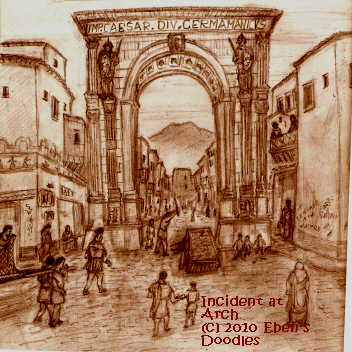
"But he won't pull the cart, officer!" the drayer protested. "He just wants to lie down and roll his eyes stupidly like that! I don't know what's got into him. Yesterday he was just fine!"
The disgusted officer flung the bloody stick away the drayer had used.
"Get your cart and your filthy beast out of here at once!" he ordered. "Kill him if you please, but not here! You're blocking the road and disturbing the peace!"
"I'll kill him all right, and cut him into little pieces if he doesn't get to his feet soon!" the drayer muttered as he went to the nearest taberna to hire some fellows to help him.
Tully pulled his father's sleeve.
"What's wrong with him, Pater?"
"I don't know, son--his eyes, he seems paralyzed with fear of something, though you would think he would be more afraid of his master's club!"
"It'll make good dog meat if nothing else!" observed one man, the proprieter of the nearby, very popular gambling house for rich, idle youth, whose sign featured two phalluses alongside a tall vase.
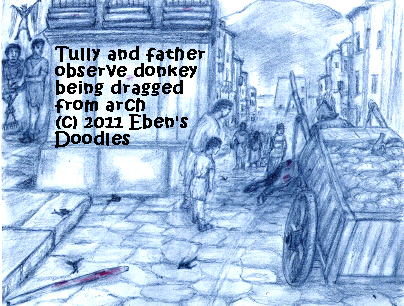
Ero? Ero was being taken on a tour by the Kater's Compass program, for he knew nothing about Pompeii. Yes, he had heard about it being destroyed thousands of years before his time, but here it all was, spread out before him in its original splendor.

"Go and see to Sulla," Cassius Septimius told his son, while he hurried off to see his wife, whom he knew must have grown concerned about the strange disturbances.
Tully found Sulla was seemingly turned mad, scratching his footpads bloody as he fought to get free.
Afraid to even touch the dog, he stayed clear back as the dog lunged against his metal collar, which cut into his neck and choked him. Whimpering and whining, the dog's eyes rolled back in their sockets. He had even bitten his own tongue, and bloody sputum drooled from Sulla's mouth.

"Pater! Pater!" he cried.
"What is it?" his father said, gripping his shoulders to calm him.
Tully couldn't know what to say. There's blood, blood all over!" he blurted out.
His father's face went pale but very stern.
"Do something, Septimius!" Tully's mother moaned. "I cannot take any more of this! The gods are punishing us, for daring to put them aside for the god of the bar-Shlomo Jew! And I don't believe a word of it, that we are getting all that money from the Imperial Treasury in Roma. It's all foolishness. It'll never happen!"
Cassius Septimius flung her a glance to silence her, then took his hands off his son, whose shoulders he was gripping too hard and hurting.
He turned to the door, with cold, ancient, aristocratic Samnite dignity in his bearing.
"You stay here with your mother, son, I'll deal with Sulla, and the horses too. It won't take long."
He went out, and Tully forgot his weeping mother and stayed by the door, waiting and listening anxiously.
Then he heard it, a sudden, shrieking, horrible yelp, like a dying animal in mortal agony would make.
His father did not return, so he crept out and retraced his steps.
What he found was Sulla lying in a heap, twitching, but his eyes closed. Then he saw the wound in his chest, pouring out blood, and a bloody sword, his father's, lying close by.
He hardly cared to do it, but he crept breathlessly to the stables. Peering round a corner he watched his father and the four stableboys lead out the snorting, stamping horses, one by one out the posticum and into the street.
"Take them to the fields and hobble them there!" his father ordered the men. "But make sure they have water. One of you stay, Calinus, stay and watch them, the rest of you return immediately. You, Cinnamon, on return, fetch the dog, for he is dead, and carry him in a grain sack and bury him someplace outside the wall. Take a shovel along too. You're broad of shoulder, you can manage it yourself. I'll look for another watchdog tomorrow. Clean up the dog's mess and wash all the stains. Do a good job! My wife is not to see anything if she goes back there--"
Tully didn't dare listen to more, he ran to his own room and hid in his bedclothes of his couch, his heart thumping. What had happened to cause all this turmoil? In less than an hour the whole household was turned upside down, and the city too seemed rocked all out of joint and its normal course of life!


